Synology DS923+ NAS Drive – Does It Deserve Your Data?
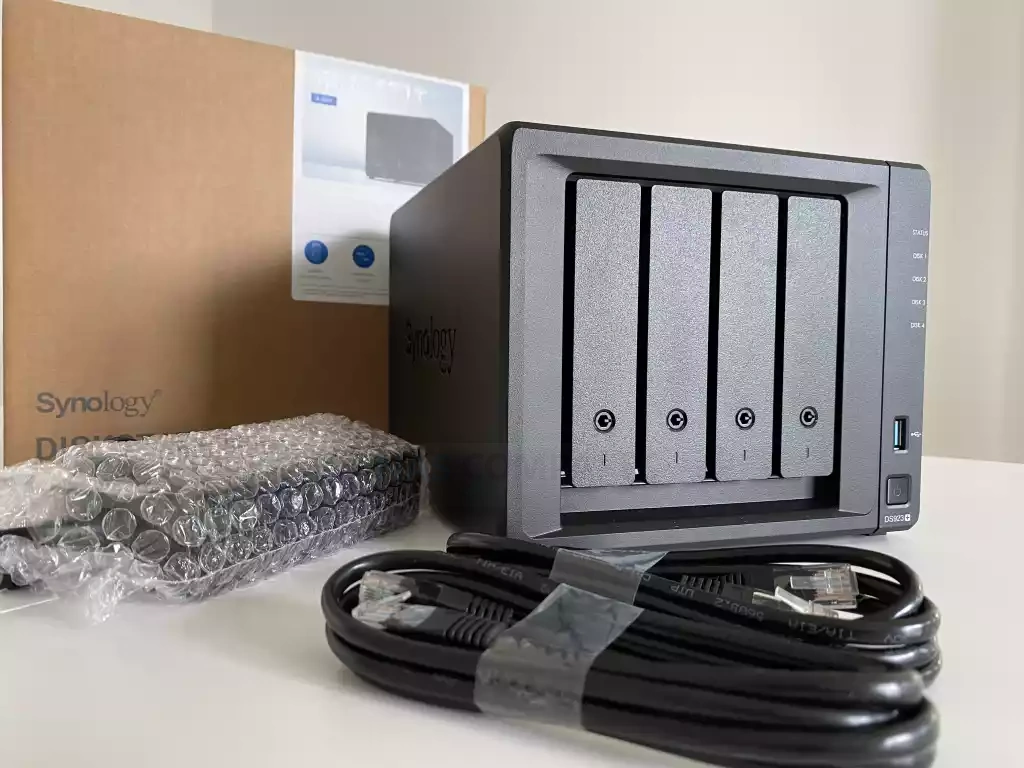
The Synology DS923+ NAS is the follow-up to the DS920+ (released over 2.5 years earlier) and this new Diskstation system has certainly made a number of BIG changes to the arguably rigid formula that the brand has been using in the last few generations of this product series. With changes in network connectivity, internal architecture and even storage capabilities arriving in the new DS923+, it is fair to say that there are ALOT of reasons why the DS923+ might be the very best NAS solution for your needs in 2023, and that is even before you think about the DSM software that is included with every Synology NAS. However, this system might not be for everyone and for all the positives that it can boast, there are still a few small areas that might mean you might want to give it a miss for your home or business data storage. Today I want to cover FIVE reasons why the DS923+ NAS deserves your data and FIVE reasons why you might want to sit on the fence a little longer and/or look elsewhere.
Note – this article covers ten things to consider before buying the Synology DS923+. However, I have already published a HUGE review on the Synology DS923+ NAS HERE on the blog and it goes into much, MUCH more detail on all these points. Check it out if you want a much bigger and broader picture of the suitability of the DS923+ NAS for your storage needs.
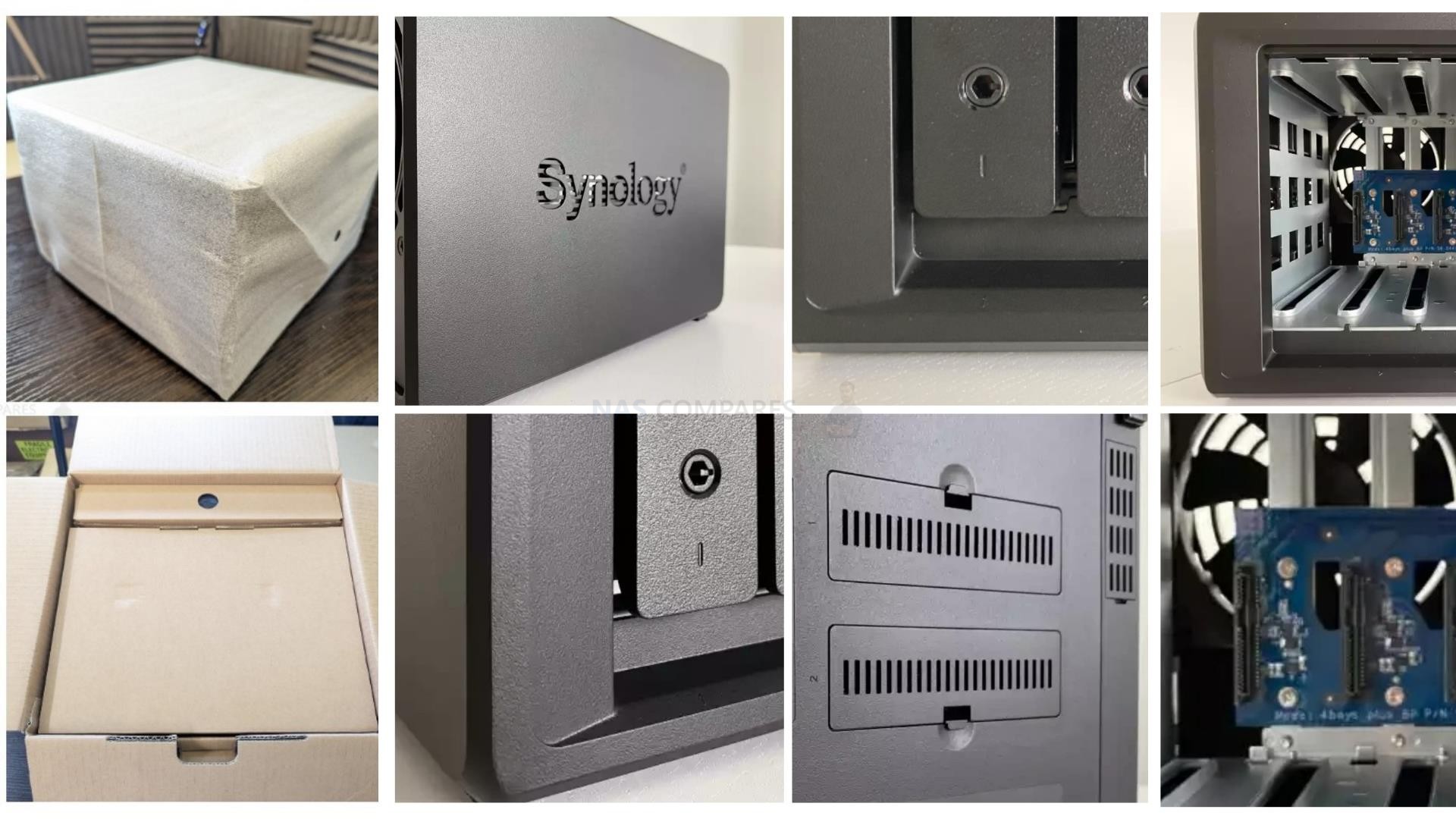
Reasons You SHOULD Buy the Synology DS923+ NAS
So, first things first! Here are five reasons why the Synology DS923+ NAS might well be exactly the private desktop server that you have been waiting for.
The 10GbE Upgrade on the DS923+
This was a feature in one form or another that users who have been looking at the expandable 4-Bay diskstation series (DS916+, DS918+ and DS920+) have been requesting for YEARS! The Synology DS923+ NAS arrives with an upgrade slot on the rear of the chassis (PCIe Gen 3 x2) that allows the installation of a 10GbE (10GBASE-T) network upgrade module that allows the system to upgrade towards a 1,000MB/s network connection! With the DS923+ NAS running on a very competent and fast-file-service internal architecture AND supporting upto 4 drives in a RAID environment to increase internal performance, the option to scale up the external connectivity to 10x that of traditional gigabit is fantastic.
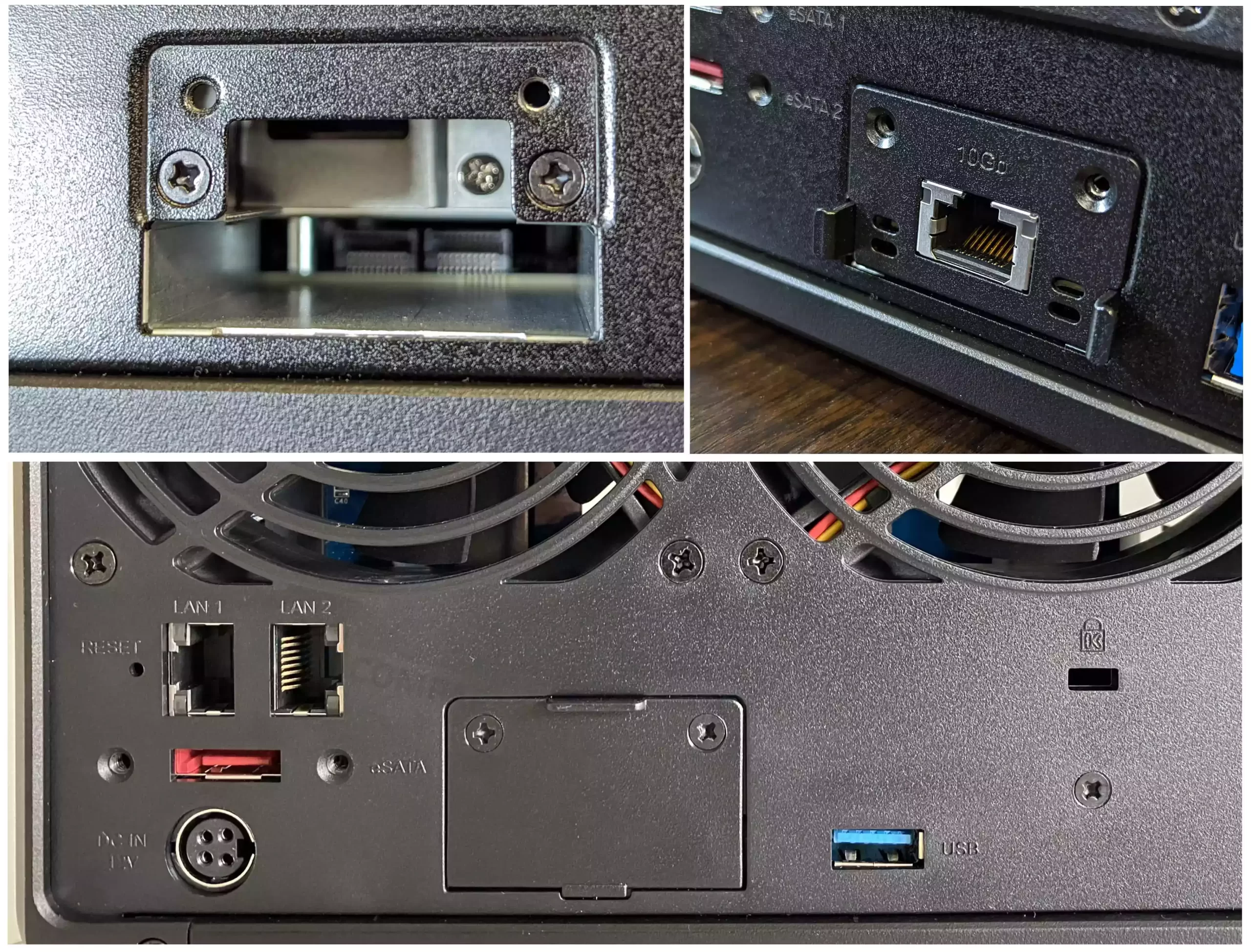 The network upgrade option on the DS923+ is delivered via an optional purchase of the Synology E10G22-T1-mini (find the Synology E10G22-T1-MINI here on Amazon), and it is a 1x Port 10G card, with its own onboard controller and heatsink attached. The module is also by far the easiest 10GbE/Network upgrade I have ever installed in a NAS, as it can be installed by popping it in the available slot on the back – as opposed to needing the chassis be partially dismantled in order to access a PCIe slot). The PCIe Gen 3×2 bandwidth that is afforded to it is more than enough for the 10G connection it provides and the 4x SATA drives inside do provide enough throughput to largely saturate the connection (and that is without factoring in the M.2 NVMe SSD bays)
The network upgrade option on the DS923+ is delivered via an optional purchase of the Synology E10G22-T1-mini (find the Synology E10G22-T1-MINI here on Amazon), and it is a 1x Port 10G card, with its own onboard controller and heatsink attached. The module is also by far the easiest 10GbE/Network upgrade I have ever installed in a NAS, as it can be installed by popping it in the available slot on the back – as opposed to needing the chassis be partially dismantled in order to access a PCIe slot). The PCIe Gen 3×2 bandwidth that is afforded to it is more than enough for the 10G connection it provides and the 4x SATA drives inside do provide enough throughput to largely saturate the connection (and that is without factoring in the M.2 NVMe SSD bays)
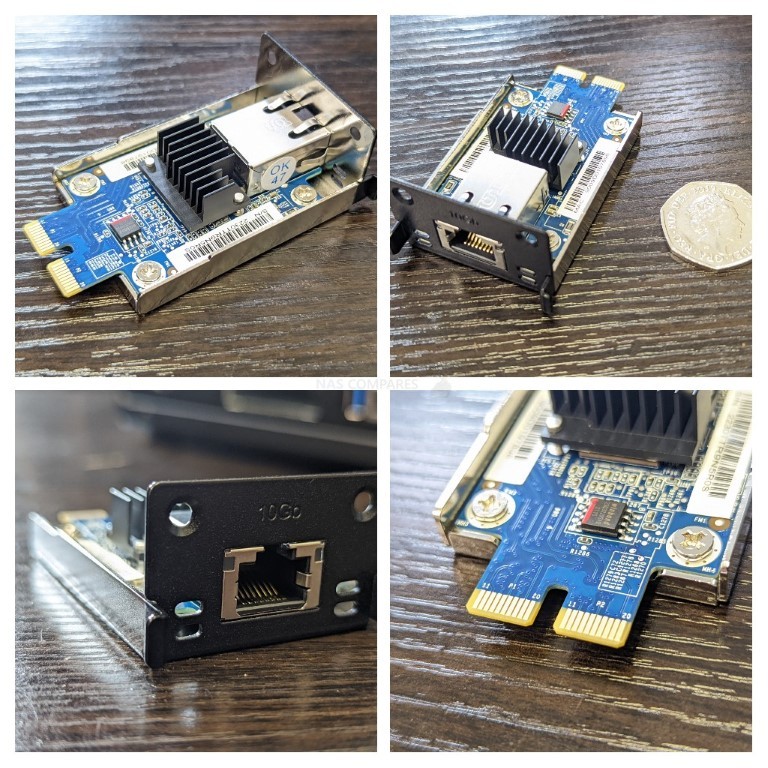
Currently, the E10G22-T1-mini is the only upgrade option that is supported by the network upgrade slot on the DS923+ NAS (as well as the DS723+, RS422+ and DS1522+), but I would not be surprised if Synology roll out an SFP+/Fibre option in due course, though the jury is still out if they were to also add a 2.5G/5GBe option.
The Memory Type and Scalability of the DS923+
Another one of the benchmarks of the expandable 4-Bay diskstation hardware that the DS923+ goes ahead and smashes is in the area of Memory. Previous generations of this series have arrived with 4GB of Memory which can be upgraded to 8GB of memory (in some cases, with the initial 4GB of memory being soldered to the main controller board). The DS923+ NAS mixes things up by providing the same amount of memory at 4GB, BUT it can support upto 32GB of memory across two SODIMM slots! that is FOUR TIMES the maximum of any other system in the series’ history and that is going to allow ALOT of apps to stretch their muscles a bit with that much RAM to share out!
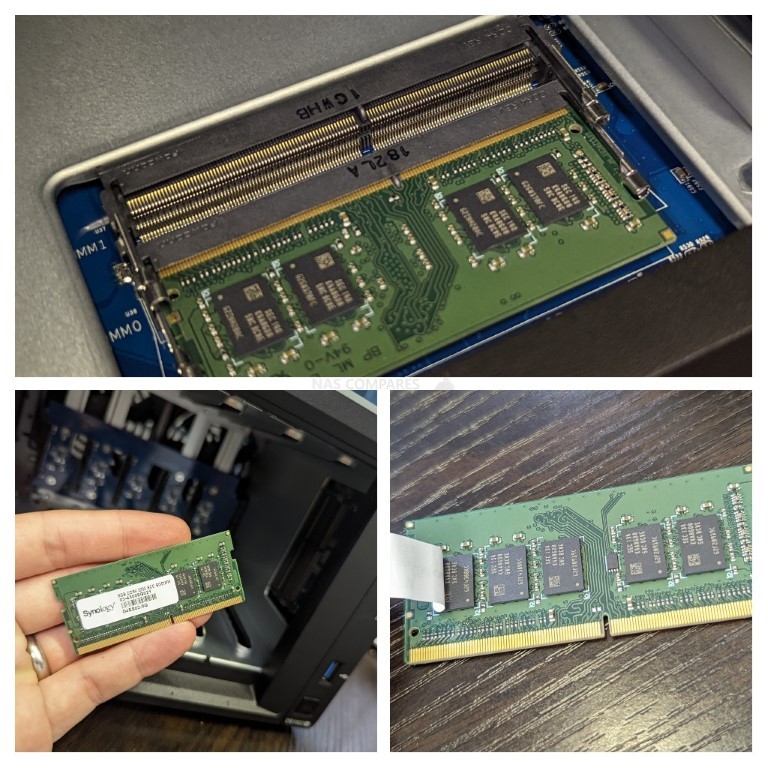
Moreover, this memory in the DS923+ improves further on its predecessors by virtue of being ECC memory (Error Correcting Code), something that you would normally only ever find on a highly enterprise server. ECC memory arrives with an extra memory chip per module on board that (in caveman terms) allows the system to have a blueprint of the data that is passing through the memory on the way to being written/sent to the disks and then, at the end of the memory processes, it is compared against the blueprint and if errors/inconsistencies are observed, the memory repairs the data. ECC has always been proven invaluable at the business level as it ensures data that has been stored on the NAS for warm or cold storage has no silent inconsistencies that down the line could result in invalid/corrupt data (e.g bitrot).
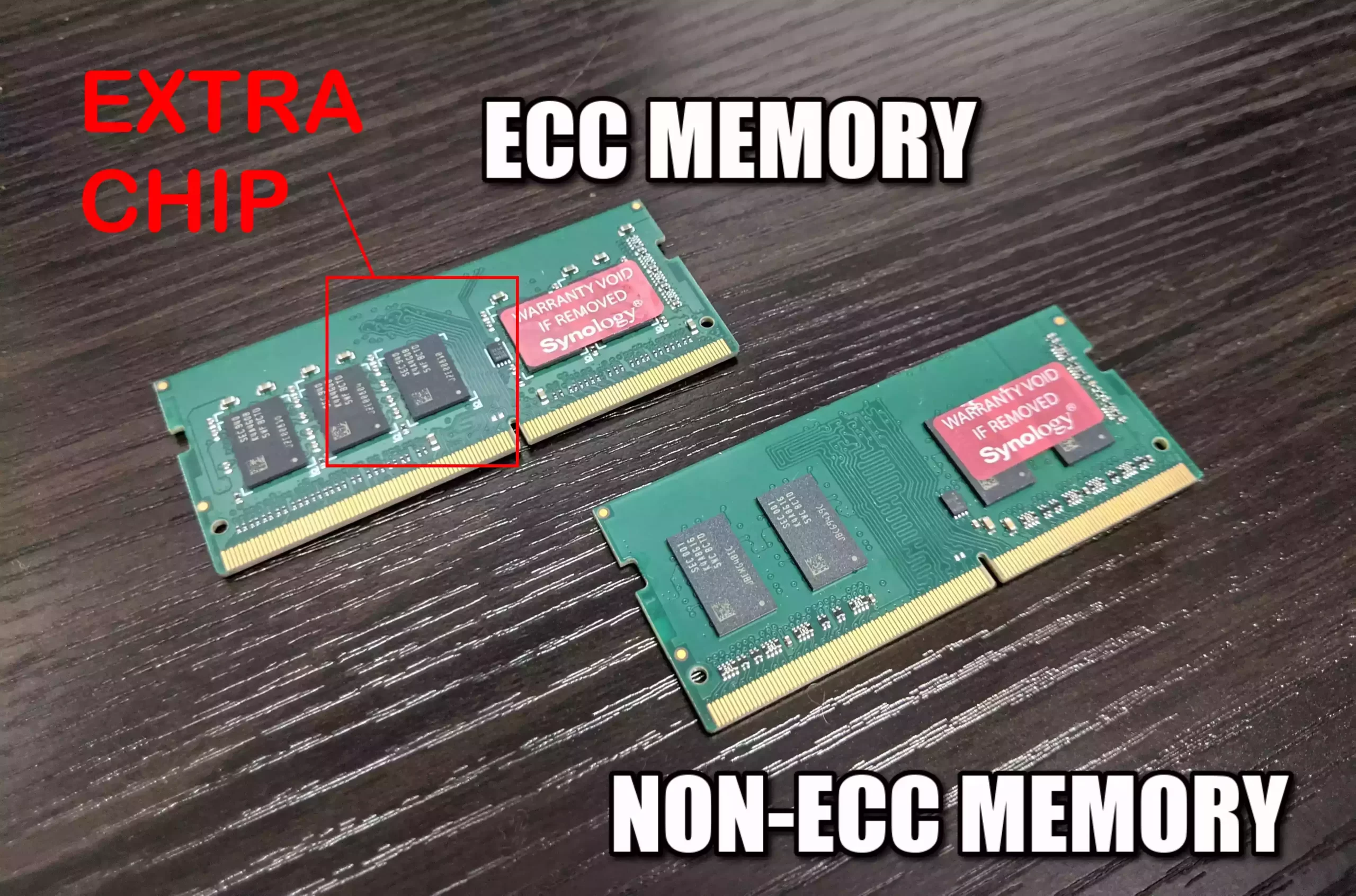
The DS923+ NAS featuring ECC memory DOES mean that official Synology memory upgrades are going to be more expensive, but the RRP of the DS923+ NAS (with the original 4GB of ECC Memory) already arrives at a very, very similar price point to its predecessor’s RRP when they were released, so any extra cost down the line is optional.
The DS923+ NAS is Compact, Quiet and Low Impact
This is a point that will appeal to a very specific % of NAS buyers, but the D923+ NAS arrives in the same 4-Bay Diskstation chassis as the DS920+ and DS918+ before it, which was very low impact in it’s design. What I mean by that is that it is quite a compact casing that is very easy to deploy, very well-ventilated on almost all sides (even the official logos on either side are ventilation panels) and is surprisingly low noise when in operation. The DS923+ has two rear active fans, but these are very small (92mm each) and are clearly low-noise fans by design. The huge amount of ventilation that passes over the internal heatsinks (no internal CPU fans or a PSU fan, as that is external) is assisted by the copious ventilation and the result is a NAS that has had alot of time in R&D to balance between internal system temps in 24×7 operation AND having low ambient noise/space impact to the end user. Below is my noise testing of the Synology DS920+ NAS (same chassis) using different kinds of HDD and SSD media to show the noise levels that were hit.
All that said, do keep in mind that the Hard Drives that you choose to use will make an impact on noise. Any NAS HDDs (WD Red or Seagate Ironwolf) of 8TB or lower capacity will be lovely and quiet (only really making noticeable noise in periods of high access frequency), but larger capacity HDDs or enterprise class/industrial built Hard Disks will make more ambient noise (vibration hum, clicks of the internal arm/actuator and spinning disk platters) and these will be easily noisier than the DS923+ noise when in operation.
FULL DSM 7.1 and DSM 7.2 Support
At Launch, the DS923+ NAS arrives with the latest version of Synology software, DSM 7.1. However, this does not stop evolving as soon as you get your Synology NAS. DSM has been in continues to be the dominant force in the world of NAS software, providing a massive arrangement of services, applications (first and third-party supported) and a huge number of client applications for desktop, mobile, Windows, macOS and Linux (as well as a bunch of other more home-based tools). These allow management and access to the data on the DS923+ in very tailored ways, as well as the web browser-based access that has the appearance, intuitive design and responsiveness of a local operating system. The DSM interface can be accessed by hundreds of users at the same time (with each user having tailored access, rights and privileges). DSM is available with ALL Synology NAS and the depth and abilities of DSM on any NAS are dependent on the hardware architecture of the NAS itself. In the case of the Synology DS923+, it supports EVERYTHING that is offered by Synology’s platform. DSM is currently in version 7.1, but it looks like we will be seeing beta/full release of DSM 7.2 at the end of 2022 or the start of 2023, which will be adding WORM (write Once Read Many) support, Volume scale encryption and numerous improvements to individual applications. If you want to learn about it, you can read the DSM 7 Full Review HERE.
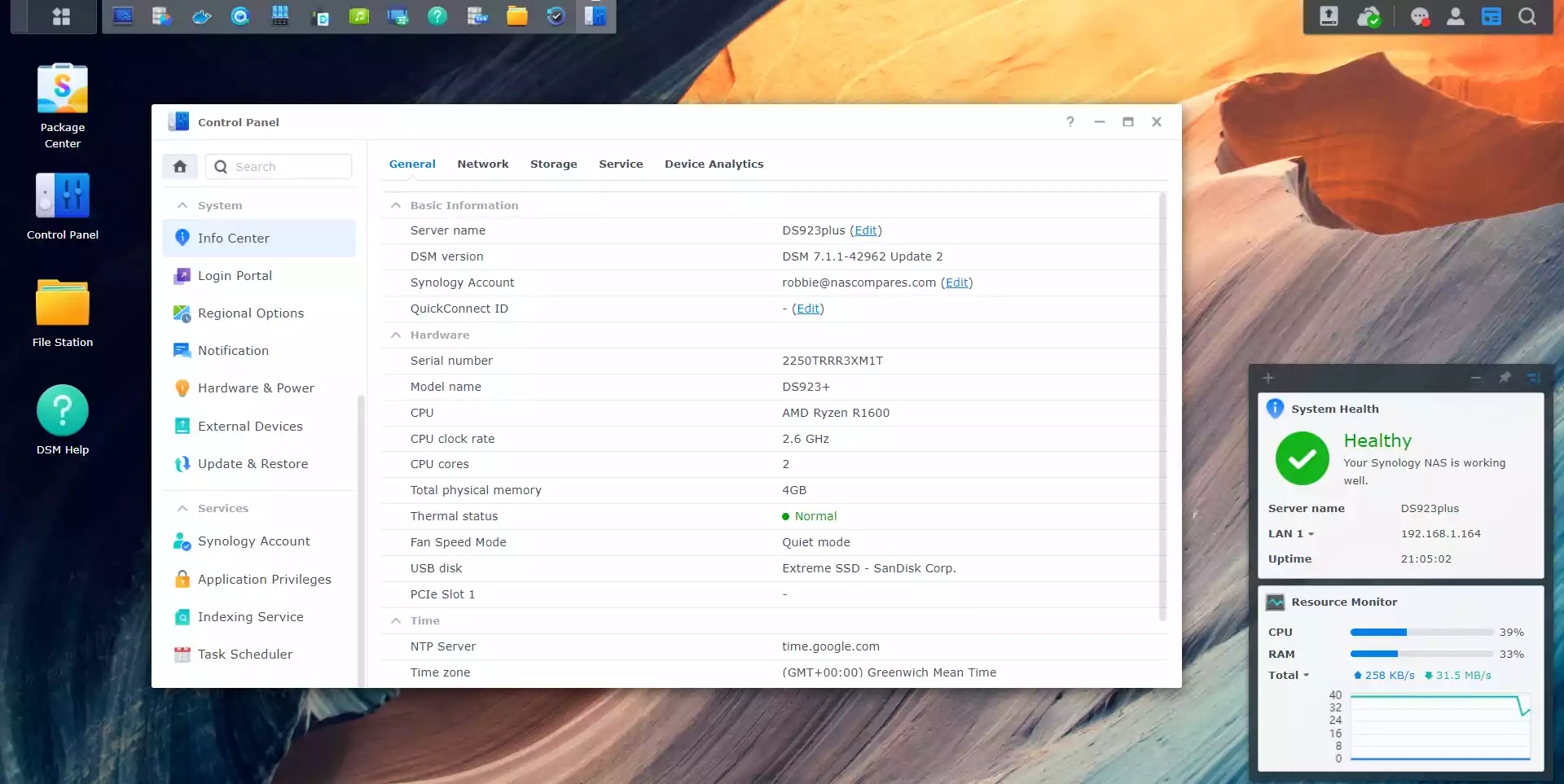
As mentioned, the DS923+ supports pretty much the entirety of the DSM 7.1 applications and services (DSM 7 and DSM 6.2 are still in circulation and still receive regular service and security updates, though the DS923+ will arrive with DSM 7.1 by default and cannot be rolled back). If you are an existing user of SaaS and PaaS (Software as a service and Platform as a service) from the likes of Google Workspace and Office 365, knowing that you can synchronize these systems or choose to export away from them onto the Synology services is going to be very appealing. Then there is the increasing development of their 1st party cloud platform, Synology C2, which is slowly integrating into all the applications that are available on your bare metal NAS (allowing you to add a cloud layer of backup, synchronization and access to your data storage setup). This is a subscription platform, which can only be used with your Synology NAS system (as well as connected with some 3rd party SaaS services, but for those that are moving away from Google/Microsoft/AWS for security reasons, but still want a Cloud+Metal storage network in place, C2 covers pretty much everything. Indeed, although below I have highlighted a number of the key/best applications that are included in your DS923+ Service with DSM, most of them can be immediately integrated with Synology C2 (with even more being added in 2023 with DSM 7.2). Key business and consumer applications that are included with your NAS are:
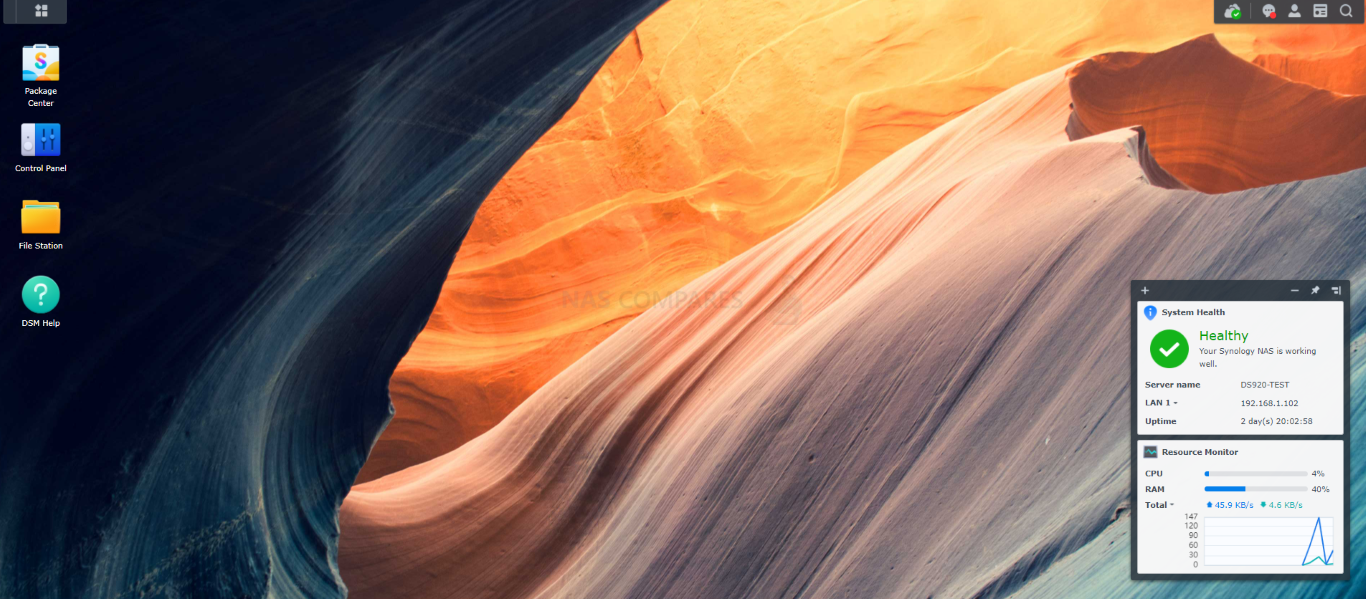
Synology Office – Create documents, spreadsheets, and slides in a multi-user environment. Real-time synchronization and saving make collaboration a breeze.
Synology Chat – Aimed at businesses, Synology Chat is an IM service that transforms the way users collaborate and communicate.
Synology Drive – Host your own private cloud behind the safety of your NAS with 100% data ownership and no subscription fees. Drive has become one of the premier applications of DSM and allows uses to create intelligent shared team folders that support versioning, file streaming+pinning, encryption, Windows AD support (soon) and native file system support with Windows and macOS.
Synology Photos – Manage your photos and videos with deep-learning algorithms that automatically group photos with similar faces, subjects, and places. Designed after the merger of Synology Photo Station and Moments, it also includes tailored folder, sharing and categorization features to help photographers manage their photos and share them with clients for feedback or business development.
Synology Calendar – Stay on track, share calendars, and schedule meetings, while ensuring sensitive information remains safely stored on company premises.
Synology Active Backup for Business (ABB) – Consolidate backup tasks for virtualized environments, physical servers, and personal computers, and rapidly restore files, entire machines, or VMs – license-free. This software also arrives as a specialised Microsoft Office 365 and Google Workspace platform to sync with those platforms and allow a bare metal tier to your cloud office services
Synology Hyper Backup – Backup your NAS safely and efficiently to multiple destinations with deduplication, integrity checks, compression, and versioning.
Synology Surveillance Station – Safeguard your business, home, and other valuable assets with reliable video surveillance tools. With improved AI services being accessible thanks to Synology BC500 and TC500 Cameras arriving in 2023. Additionally, you can connect this platform with Synology’s cloud platform to use ‘C2 Surveillance’ and bolster the odds of recordings being maintained in the event of accidental/malicious damage to your surveillance system.
Synology Virtual Machine Manager (VMM) – An intuitive hypervisor that supports Windows, Linux, and Virtual DSM virtual machines. Its powerful disaster recovery tools help users achieve maximum service uptime.
Synology High Availability – Synology High Availability (SHA) combines two Synology NAS servers into one active-passive high-availability cluster, alleviating service disruptions while mirroring data.
Synology Central Management System (CMS) – Synology CMS allows you to manage multiple Synology NAS servers quickly and conveniently from a single location.
Synology Video Station – Manage all your movies, TV shows, and home videos. Stream them to multiple devices or share them with friends and family.
Synology Audio Station – Manage your music collection, create personal playlists, stream them to your own devices, or share with family or friends.
Synology File Station – Manage your Synology NAS files remotely through web browsers or mobile devices. This tool allows complete file management and contains all the features and services of your own native file management platform (archiving, extracting, Copy, Cut, Paste, Sharing, native file format opening, integration with the rest of the Synology applications, property/metadata access, etc)
You cannot really fault the software and services that are included with the Synology DS923+ NAS, as you are going to get the very best experience available on the platform, thanks to the hardware and architecture of this NAS. DSM 7 is an ever-evolving platform, so if you are reading this now at the time of publishing or years later, there is always going to be something in DSM for everyone. That said, Synology in recent years has been increasing its priorities towards first-party software and services. This does make sense, as they want to promote their systems and software as a complete ecosystem for your home or business data storage needs (going on in the last few years to release even more Synology alternatives to popular software AND releasing non-NAS hardware accessories such as Routers, Network Adapters, HDDs, SSDs and now IP Cameras). This can occasionally lead to the compatibility lists of hardware or software that you wish to use in conjunction with the DS923+ NAS being a little smaller/restricted than you might like. A specific 3rd party software/service or physical accessory (HDD, Memory module, Network Upgrade) might not appear on the Synology compatibility pages, but that does not mean it will not function with the DS923+ NAS. It is more a case of Synology choosing not to test/evaluate a particular setup (in their defence, there are ALOT) and therefore until stated otherwise is therefore listed as incompatible and is therefore being used without their full, guaranteed support long term. In short, you can DEFINITELY feel that DSM 7/7.1 is a fantastic NAS platform, but it comes with a certain degree of rigidity by Synology on the DS923+ NAS. A little more relaxed than entries in the Enterprise XS or SA systems, but it is definitely still there.
PCIe Gen 3 M.2 SSD Support and the Future of Synology Storage
Note – M.2 NVMe SSD Bays as Storage Pools Confirmed (images of use and storage options) are detailed here in a newer post – https://nascompares.com/2022/11/16/synology-nas-and-m-2-nvme-ssd-storage-pools-finally
A long-running feature of many prosumer and business desktop NAS systems from Synology is the inclusion of M.2 NVMe SSD bays. Synology was in fact the first NAS brand to offer this hardware feature on desktop NAS turn-key systems (on the DS918+ back in 2017/18) and over time the utility of super fast M.2 NVMe SSDs to improve the performance of traditionally slower, larger RAID configurations populated with HDDs have got better and better. The new DS923+ NAS, as expected, arrives with these SSD bays BUT there are two very important and VERY interesting changes that this system provides that dwarf their utility in previous releases in this series.
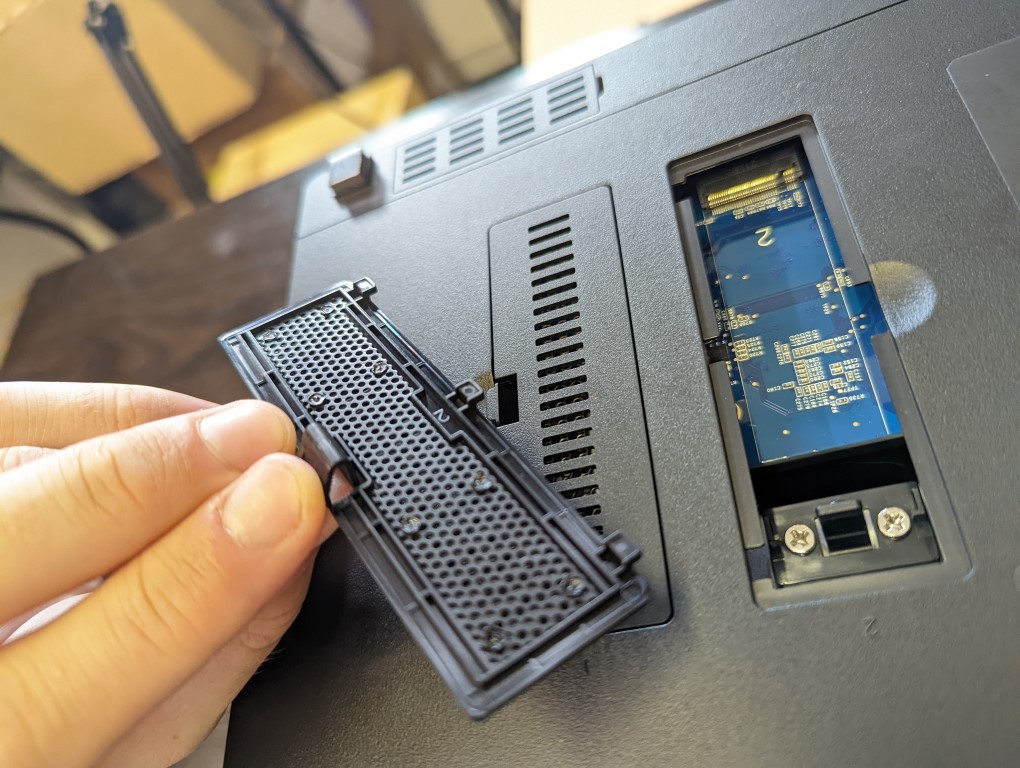
The first detail is that the Synology DS923+ NAS, thanks to it’s newer generation CPU, arrives with PCIe Gen 3 architecture. This means that the M.2 NVMe Bays inside are PCIe Gen 3×4 slots – each with a potential 4,000MB/s of bandwidth (that is bandwidth, i.e space to fill – performance/speed will still be dictated by the SSDs you use and their own benchmarks). The DS920+ and DS918+ before it both had PCIe Gen 2 architecture and these bays were either PCIe Gen 2×2 or Gen 2×4 (Half or even a Quarter of what the DS923+ bays can accommodate. Given the cost of M.2 NVMe SSDs in terms of price per terabyte compared with NAS hard drives (some 4-5x difference in price, depending on the drive), it is going to be much, MUCH more gratifying to know that you will have more opportunity to take advantage of their performance internally on the DS923+NAS.
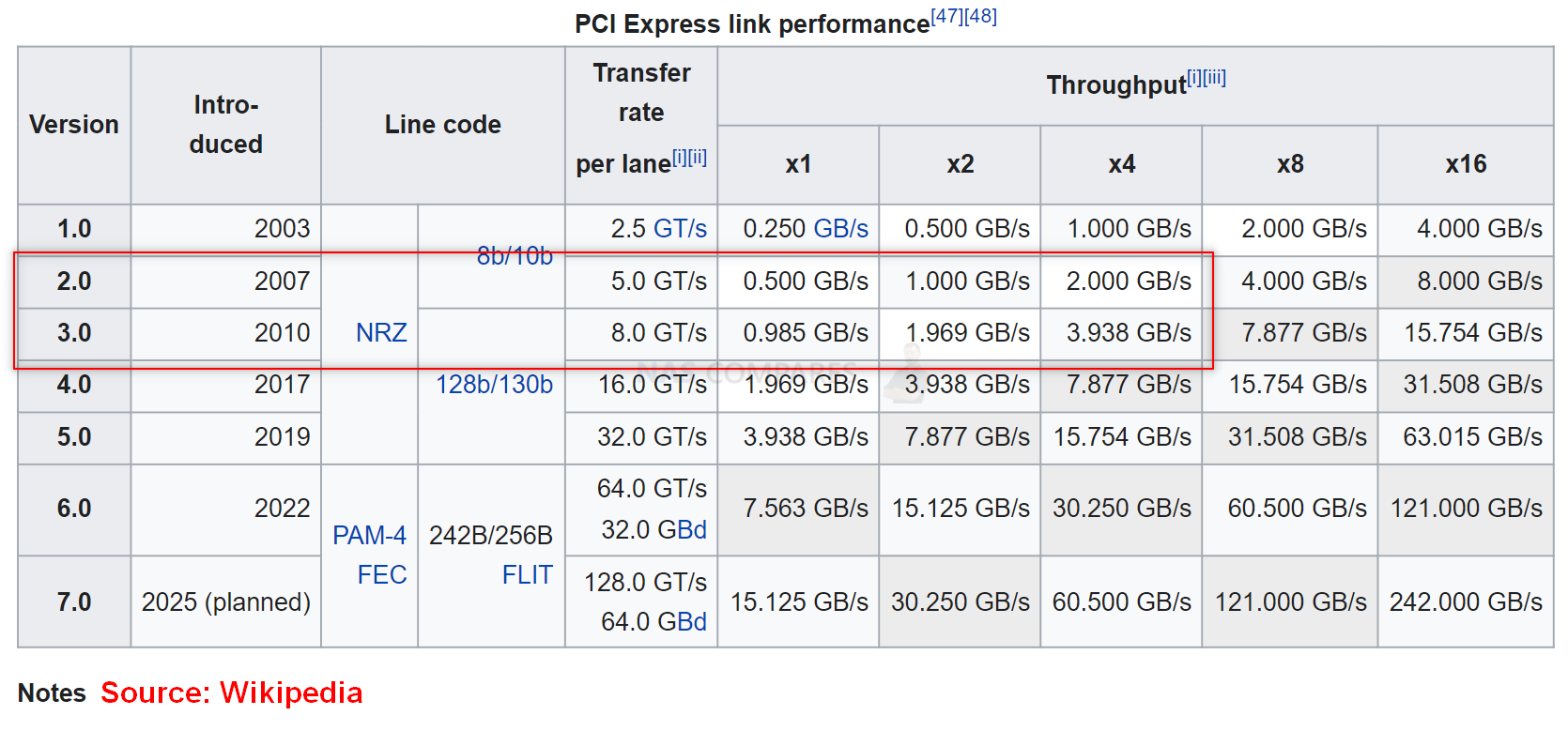
However, the real big difference that the DS923+ NAS brings to the party is that soon these M.2 NVMe SSD bays will be usable as Storage Pools in DSM. Up until now, the M.2 NVMe 2280 bays on Synology NAS hardware has been restricted to ONLY being used for caching. Caching is a process of utilizing the performance benefits of SSD to compensate for the slower HDDs in specific instances. Read caching is when small/background/io data that is more frequently accessed by connected users is copied to the faster SSDs to improve access times (lowering latency and increasing responsiveness) for connected clients/services (does not really benefit large/sequential data). Write Caching is a process whereby, when data is being written/uploaded to the NAS, the data is first written to the M.2 NVMes, to then (later/after) be written internally to the larger capacity but slower HDD RAID array. As good as these sound, most users have wanted to use this area of massively faster and more expensive to populate media for storage pools and volumes for YEARS! Now it appears it is coming and the DS923+ NAS is the first NAS to benefit from this:
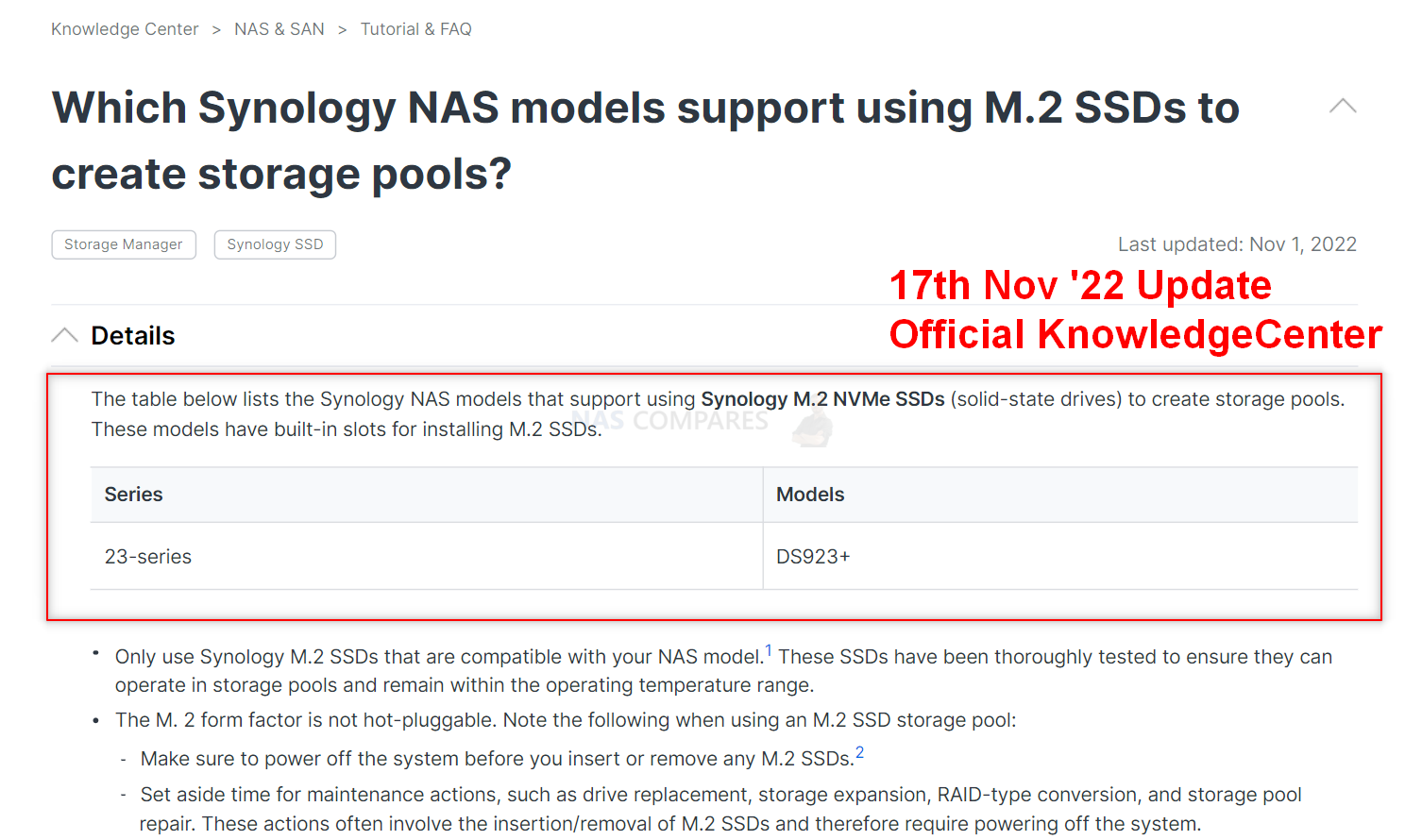
UPDATE 16/11/22 – We just received word that the M.2 NVMe SSD Bays on the DS923+ and several other Synology NAS systems are going to be usable for both Storage Pools and SSD caching. Details are emerging on this, but much more information on this can be found here – https://nascompares.com/2022/11/16/synology-nas-and-m-2-nvme-ssd-storage-pools-finally
It is also worth noticing that no other Synology NAS are listed as supporting this feature right now – likely to do with a minimum hardware threshold stipulated by Synology for this (a higher performing CPU for throughput/file-transfers and gen 3×4 architecture on the M.2 slots).
Reasons You SHOULD NOT Buy the Synology DS923+ NAS
Of course though, the Synology DS923+ NAS is not going to be everyone’s cup of tea. It is fair to say that there are some elements in this follow-up to the 2.5yr old DS920+ that have rubbed a few users up the wrong way. Let’s discuss the five reasons why the DS923+ NAS (and indeed a Synology system in some cases) might not be the ideal private server solution for you.
The CPU in the DS923+ is a little divisive
The CPU inside the DS923+ is the AMD Embedded Ryzen R1600 processor, an x86 64bit Dual core, four-thread processor with an impressive base level clock speed of 2.6Ghz that can be scaled up to 3.1Ghz when needed. Now, the DS9xx+ series has always arrived with a Quad Core Intel Celeron (or Pentium) processor in the past and when it was revealed that the DS923+ was arriving with a dual-core embedded ryzen, many users were a little unhappy. This was largely down to two factors. The first was that the R1600 is a dual-core, not the four-core that everyone expected. Now the R1600’s four-thread architecture does allow the CPU to spread out quite alot across tasks and services (as well as virtual CPUs in VM deployment), as well as having a higher power in both base and burst mode available, which means it isn’t a bad CPU! But the bigger area of contention from some buyers is that the R1600 lacks integrated graphics. This means that for some tasks and services that are more graphical in nature, the result will be a higher typical CPU Uages % than a processor that has a more specialized graphics management component onboard.
How the Synology DS920+ Intel Celeron J4125 and DS923+ AMD Emb.Ryzen R1600 Compare:
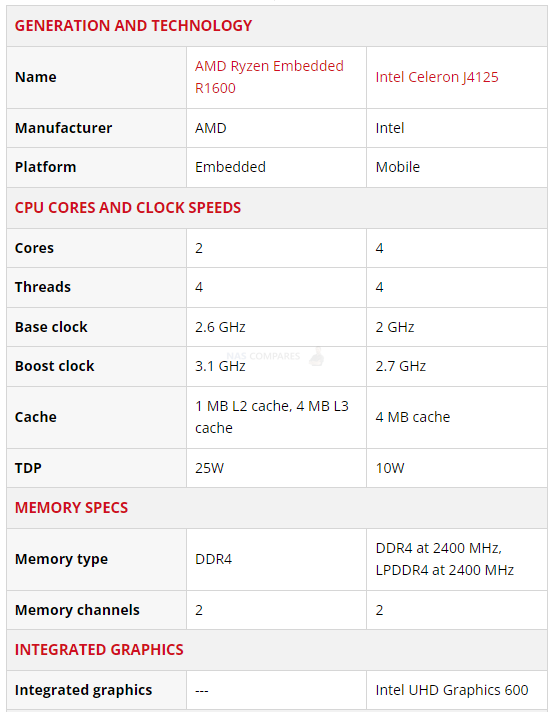
The traditional data handling of the R1600 is very good, as seen in our DS1522+ testing earlier in 2022. As far as DSM (the Synology software) is concerned it will be able to run EVERYTHING! Additionally, the general file handling and throughput internally are going to be great too, so all good news. Then you have the advantage of the newer gen CPU in the DS923+ over the DS920+ supporting PCIe3 lanes, affording greater bandwidth to the rest of the hardware (i.e those M.2 slots being higher bandwidth and enabling that network upgrade slot), all the while with the CPU having the potential to hit 3.1Ghz of power when needed. It is genuinely a good CPU and there are lots of reasons why Synology have opted for this CPU, but it is by no means perfect and some specific user setups and their concerns do have merit.
For a start, the AMD R1600 has a higher typical usage (unsurprising for the spec and generally identified as TDP, as a maximum) compared with the avg Intel Celeron being used in other NAS systems released in 2022 (such as the Intel N5105 or J6412) and in a system that will be in operation 24×7, this is going to a question mark for those affected by erratically rising energy prices right now, The difference might only be pence on the day, but those pence add up! Then there is the dual cores. Although having the four threads IS handy and will be useful, Cores will always beat threads when it comes to capabilities.
The DS923+ arrives with 1GbE By Default
Those ethernet ports. The default model of the DS923+ NAS arrives with two-gigabit ethernet ports (the same as the DS920+, DS918+ and DS916+ before it), despite almost other commercial NAS brand producing solutions at this consumer-tier/scale arriving with at least 2.5GbE. Now, the adoption of greater than gigabit connectivity in client hardware (laptops, PCs, routers, switches, docking stations, etc) is by no means as ubiquitous as 1GbE (which has been around for decades at this point), BUT it is growing. ISPs are providing fiber internet connections globally that exceed gigabit speeds, along with 2.5GbE and WiFi 6 routers. We are seeing more prosumer switches, routers and PCs with default 2.5Gb network ports (at the same/similar cost as 1GbE), $20 USB-to-2.5G adapters and even the affordability of 10GbE on some client devices has allowed users to gradually scale up their hardware environment. The fact the DS923+ arrives at the tail end of 2023 and does not feature greater than 1GbE ports by default is quite damning. Even if you have no plans for 2.5G right now in your setup and think it something of a fad (favouring 10GbE), in terms of future-proofing and the general standard or networking hardware right now, gigabit ethernet is a surprising weakness here.
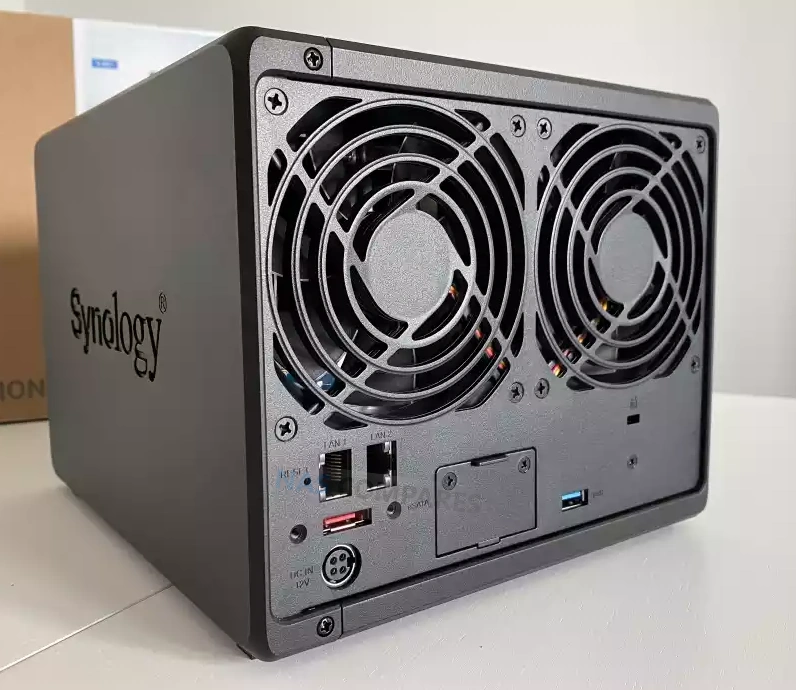
USB Support on the DS923+ is a little Underwhelming
The DS923+ arrives with two USB Ports (one on the front and one the rear) and it is here that we should touch on another thing about the device that I am a little less blown away by. The USB ports here are USB 3.2 Gen 1, so 5Gb/s (500-500MB/s max bandwidth). Much like the 2.5G vs 1Gb complaints I made earlier, most other NAS brands at this hardware tier have rolled in USB 3.2 Gen 2 (10G / 1,000+ MB) ports, as well as USB-C in some cases. With the ease with which a user can add a USB tier to their 3-2-1 backup strategy (allowing them to be a little more financially creative with a network/remote/cloud backup tier as well), the slightly old skool USB ports here are a little underwhelming. With significantly more affordable RAID-enabled USB solutions in the market and/or M.2 NVMe external USB drives arriving affordable to comfortably provide faster external storage for backups, this seems like a bit of a misstep by Synology to ignore.
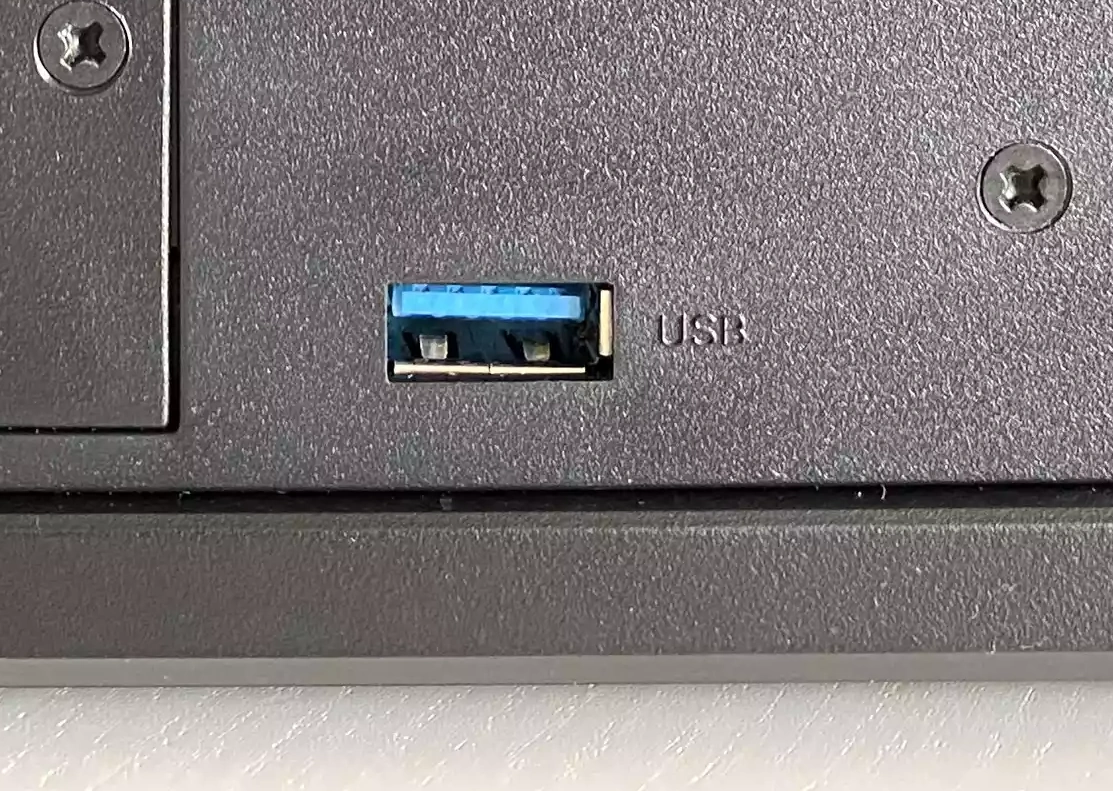
Also, DSM 7 and DSM 7.1 (with DSM 7.2 coming soon enough) have reduced the range of use of the USB ports of Synology NAS systems (removing many network adapters, DTV tuners, wireless dongles, office accessories such as printers, scanners and optical drives), and limiting them largely to storage, UPS’ and assigning them to VMs. I am sure Synology has done the market research and observed reduced utilization of USB on their systems to dictate this decision, but it seems to be another move by the brand to prioritize network/remote access only with their systems.
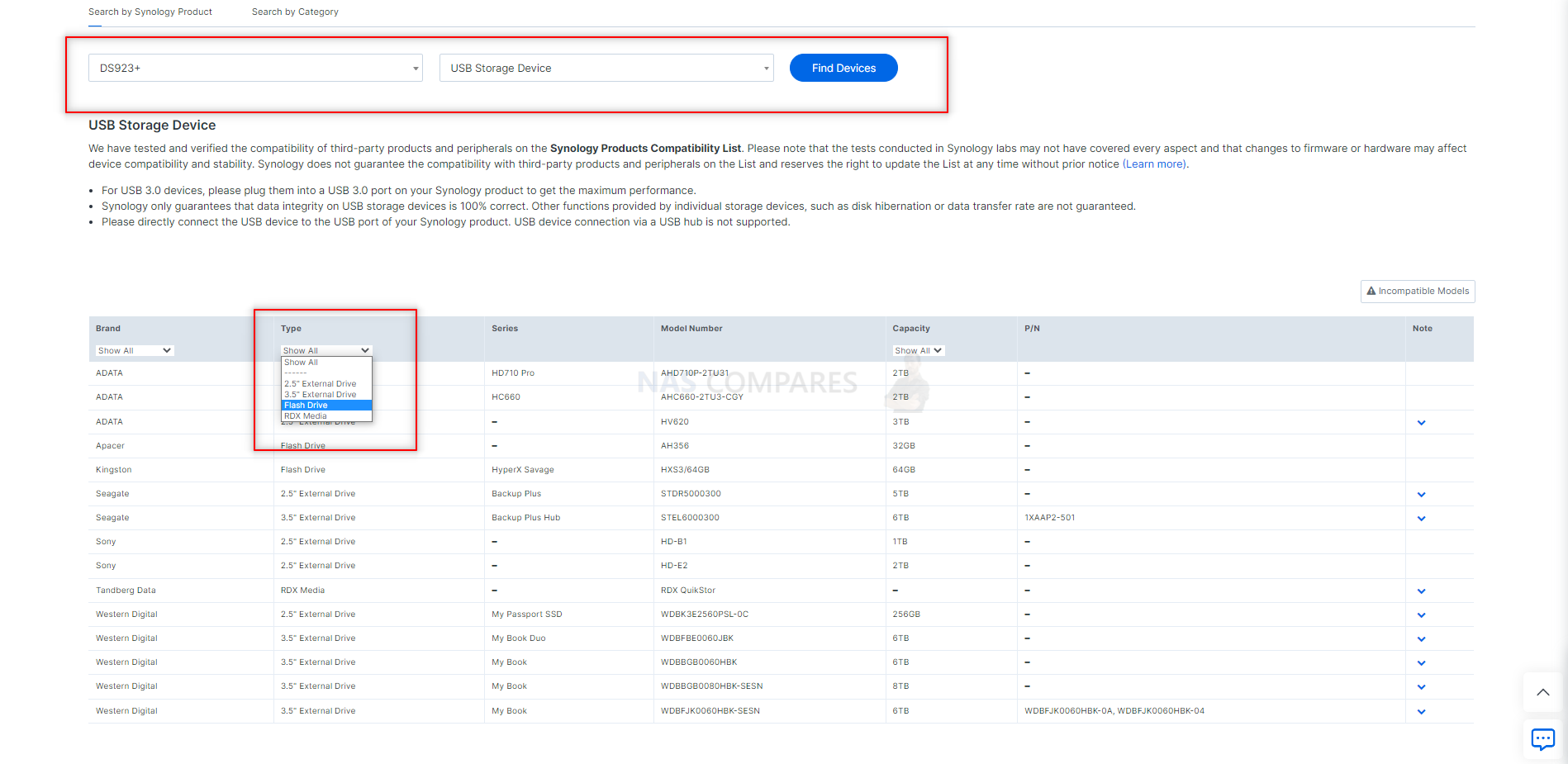
Synology Continues to be Increasingly ‘1st Party’
Now, I have listed this as a ‘con’ and/or ‘reason to not buy the DS923+ NAS’, but really this could well be a positive for many business NAS buyers or those that want a much easier system to manage, upgrade – especially those who do not have much technical knowledge and/or an in-house IT admin. Over the last 4-5 years we have seen Synology become increasingly focused on it’s own first-party hardware and services. This is not uncommon (it would be weird if they didn’t invest heavily in developing their platform!), but many have highlighted that this has been to the detriment of it’s support of popular/common 3rd party hardware and software. Synology is increasingly becoming a ‘one-ecosystem’ platform (again, not necessarily a bad thing) that wants to provide a COMPLETE solution for a users network and data storage needs. DSM still supports a large number of 3rd party business services and platforms (SaaS and PaaS once, such as Office 365, Google Workspace, Hyper-V + VMware to name just a few) AND home/homelab ones like Plex, Docker, Emby etc. However, as new innovations arrive from the brand, they seem to arrive with their own services/hardware being first in line and (in some cases) no 3rdd party integration/connectivity at all. The biggest move on this came at the start of 2022 when DSM 7 introducing a stricter HDD/SSD compatibility list that resulted in most non-synology HDD/SSDs if used, ending in DSM displaying a critical warning. This has since been rolled back a little in DSM 7.1 (no longer a critical warning, but not exactly wrinkly-free), see below the installation of WD Red Pro drives in the DS2422+ NAS:
Now, you CAN go ahead and use these drives, but it is a little jarring. As mentioned, the presentation and messaging for this have been SIGNIFICANTLY IMPROVED in the recent DSM 7.1 updates, but this was the straw that broke the camels back for some users. With the fantastic cloud synchronization tools and services being introduced (Hybrid Share, Surveillance C2,etc) but with strict support for only Synology’s own cloud platform ‘Synology C2’, it is a little hauling when you have a AWS, Backblaze and/or Enterprise cloud account you could be using. The same goes for storage media compatibility, with the official compatibility of the DS923+ (which DOES include a large number of Seagate Ironwolf, WD Red and Toshiba HDDs alongside the HAT5300 & SNV3400/3410). The maximum capacity HDD listed is 18TB (see below), likely because that is the largest HDD that Synology provide in their branded series, the HAT5300 – despite WD Red Pro, Ultrastar and Seagate EXOS/Ironwolf Pro providing 20TB and 22TB NAS hard drives right now (both of which have been tested and working – see images above).
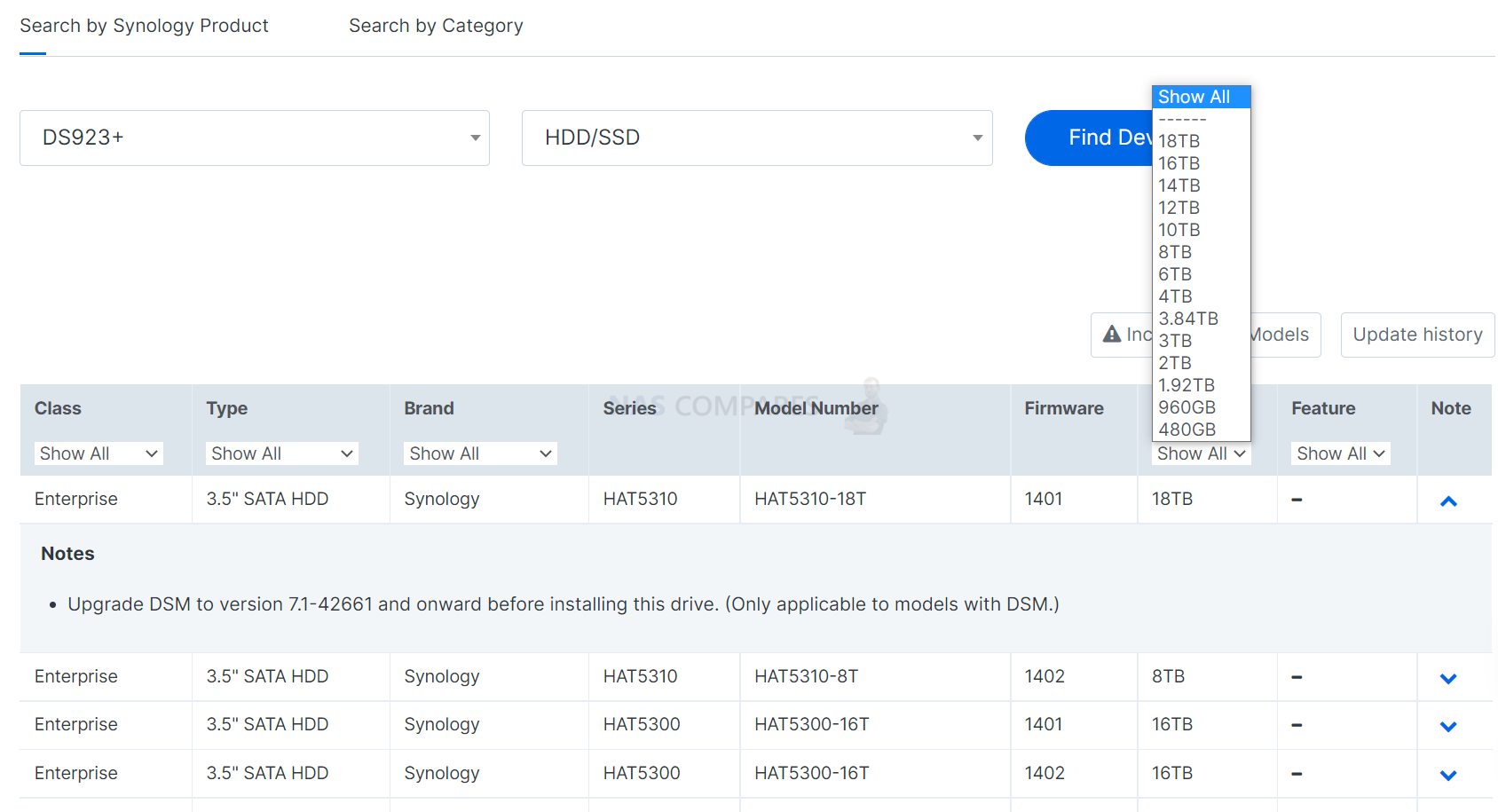
Again, this all makes sense. Synology want their platform to be the best it can be and they cannot test/verify ALL components – it would be a borderline unlimited task! So they have decided to make it clear that unless they are 100% confident that a 3rd party component will provide the performance/services to the standard they officially state, they cannot confidently say they will support a user that is running an unverified setup. However, there are some areas where this is pushing the limits a little, such as the memory/RAM compatibility of the DS923+ NAS. Only Synology ECC DDR4 SODIMM memory is listed, despite it almost certainly being a rebranded module from Samsung, Kingston, Crucial or ADATA to begin with and costing significantly more than those. The HAT5300, SNV3400/3410 and SAT5200/5210 can make a compelling case that they have Synology firmware onboard that differentiates them from 3rd party drives or the original Toshiba MG06/07/08/09 they are built on – but the strict rules on Synology memory are very restrictive.
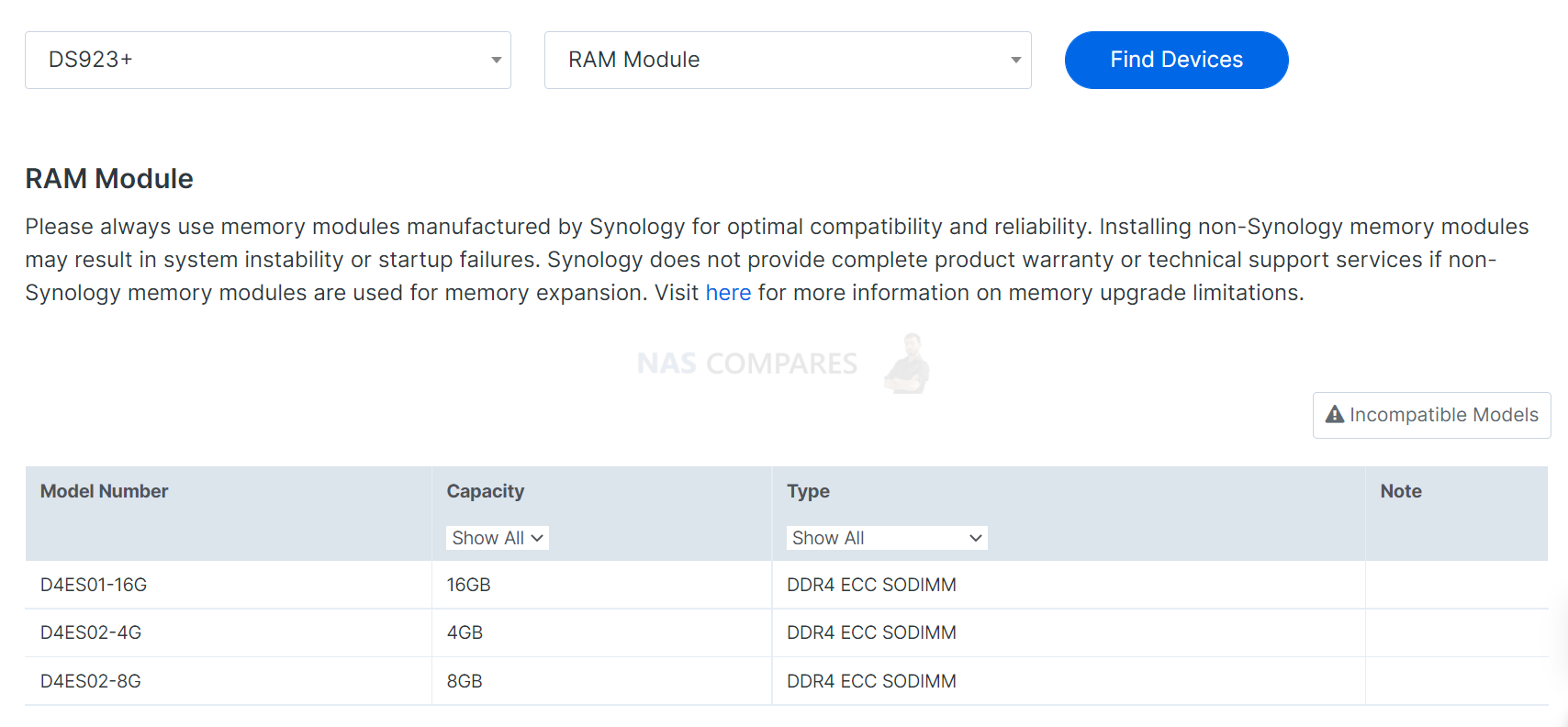
The same goes for the compatibility of M.2 NVMe’ on the Synology DS923+, with only Synology SNV400 and SNV3410 SSDs on the officially supported list, despite many, MANY others being supported. With the DS923+ soon to be the first Synology NAS to allow M.2 NVMe SSD storage pools, this is the kind of limitation/restriction that (if left unchanged after the update, later in release and/or DSM 7.2) is going to ruffle some feathers!
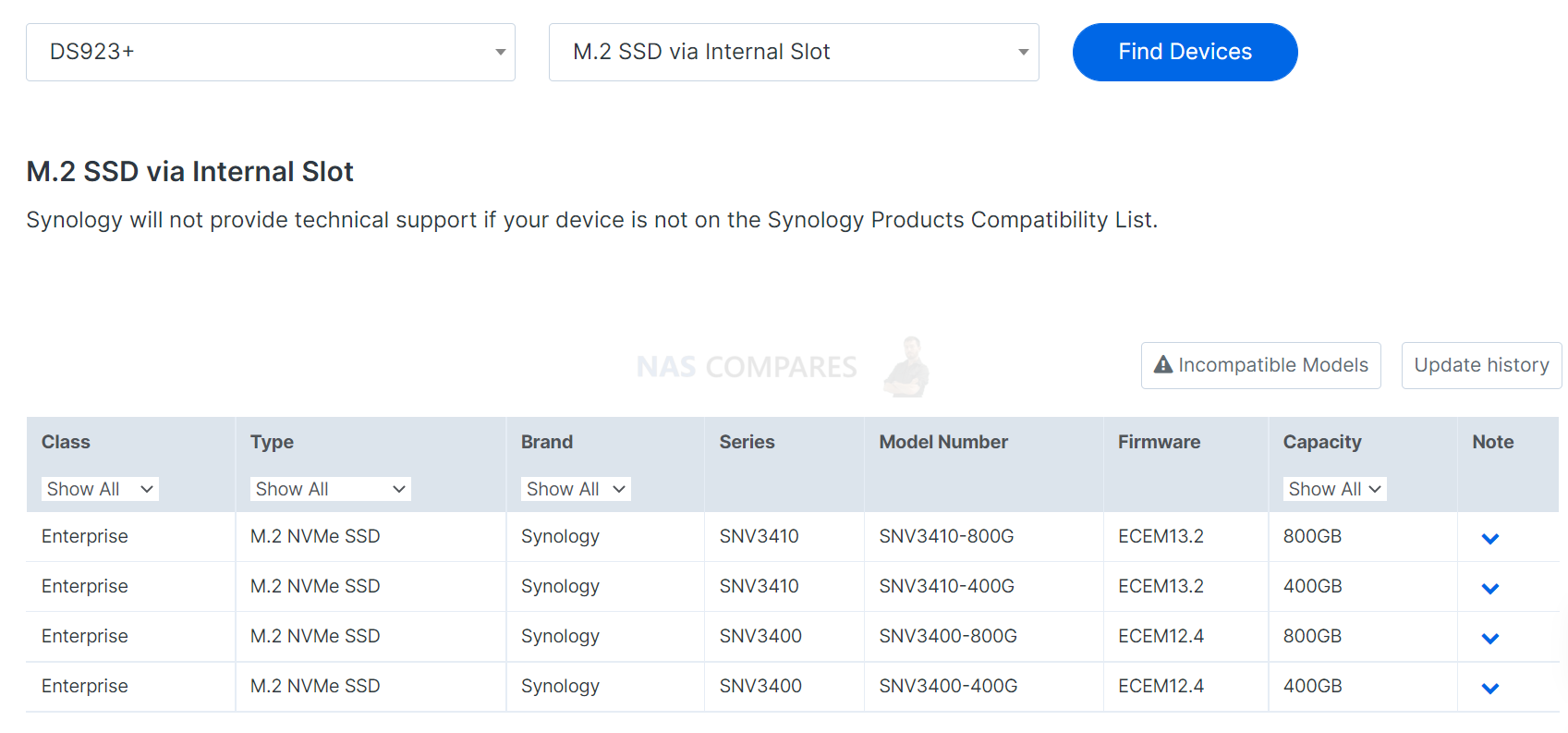
As mentioned, I completely understand why Synology are taking this position – they are a company that is much more about their software (DSM) and its prestige/abilities than they are about the hardware. Synology DSM continues to be THE BEST NAS software in the market and alot of that is down to how Synology invests in it. That kind of investment and continued innovation in services and abilities to create the perfect one-brand ecosystem is built on them putting their platform first! But there is no avoiding that users who are considering the DS923+ NAS for its hardware, so they can run their own 3rd party software and/or want to upgrade using non-Synology components, might be less keen on this position.
Server Side HEVC/H.265 Support and Conversions on the DS923+ are Weak
Finally, there is a lack of integrated graphics. Most users will not notice this as an issue in day-to-day use, but multimedia users and especially a large % of Plex users will notice, if they are a little more reliant on the server-side processing than on the client. For example, if your media collection contains alot of dense/complex audio media (RAW, MP4a, etc) OR alot of higher-end HEVC/H.265 Media BUT you do not have client hardware that supports these types (or allows local client conversions/transcoding), then the NAS will have to use raw horsepower to get the job done – much less efficient than embedded graphics doing the job. Again, you might not be impacted by this (your client hardware might have enough power and privileges, or you own a local HEVC-licensed device), but it IS a concern if you are running a Plex Media Server on the DS923+ and need the NAS to convert files on the fly. Earlier in 2022, I compared the DS920+ (with a Celeron) vs the DS1522+ (with this same AMD R1600) in a detailed YouTube video testing 4K Media in Plex. Here are the results:
Synology DS923+ NAS Review – Conclusion & Verdict
(Original MASSIVE DS923+ NAS Review HERE) Synology has clearly made something of a gamble in the release of the Synology DS923+ NAS. There is no avoiding that making the switch from the Intel Celeron that has historically been the build choice of this product family and opting for the AMD Emb.Ryzen has ruffled some feathers! On the face of it, the R1600 here has a heck of alot of going for it over the previous generation! Higher clock speed, greater PCIe Gen 3 Support throughout, that 4-32GB of DDR4 memory in such a compact system and just generally giving you a lot more horsepower to play with, as well as better bandwidth potential inside and out! But at what cost? The 1GbE standard connectivity in the base model leaves alot to be desired, the proprietary 10Gb upgrade (though incredibly handy) limits the upgradability a tad and the lack of an integrated graphics processor is likely going to result in many long-term Synology advocates to skip this generation. Synology Diskstation Manager (DSM 7.1 at the time of writing) still continues to impress and although the brand still continues to heavily push their 1st party priorities, they have left a little more wriggle room in DSM 7.1 than DSM 7 before it in terms of media compatibility. In terms of design, I cannot fault Synology on this as the DS923+ chassis still arrives as one of the best-looking and still exceptionally well-structured devices at this physical scale and storage level. As always, a Synology NAS is more about the software than the hardware (and the DS923+ delivers in spades on the software side!) and with DSM 7.2 around the corner improving things. Just always keep in mind that the Synology DS923+ NAS is a system that arrives with the slight emphasis on having to do many things ‘their way’. If you are less technically versed, then you will definitely appreciate this level of user-friendly design and assistance, but more technically minded admins’ main strain a pinch! In short, the DS923+ IS a good NAS drive, but its focus has certainly ebbed more towards the business user this generation than the home.
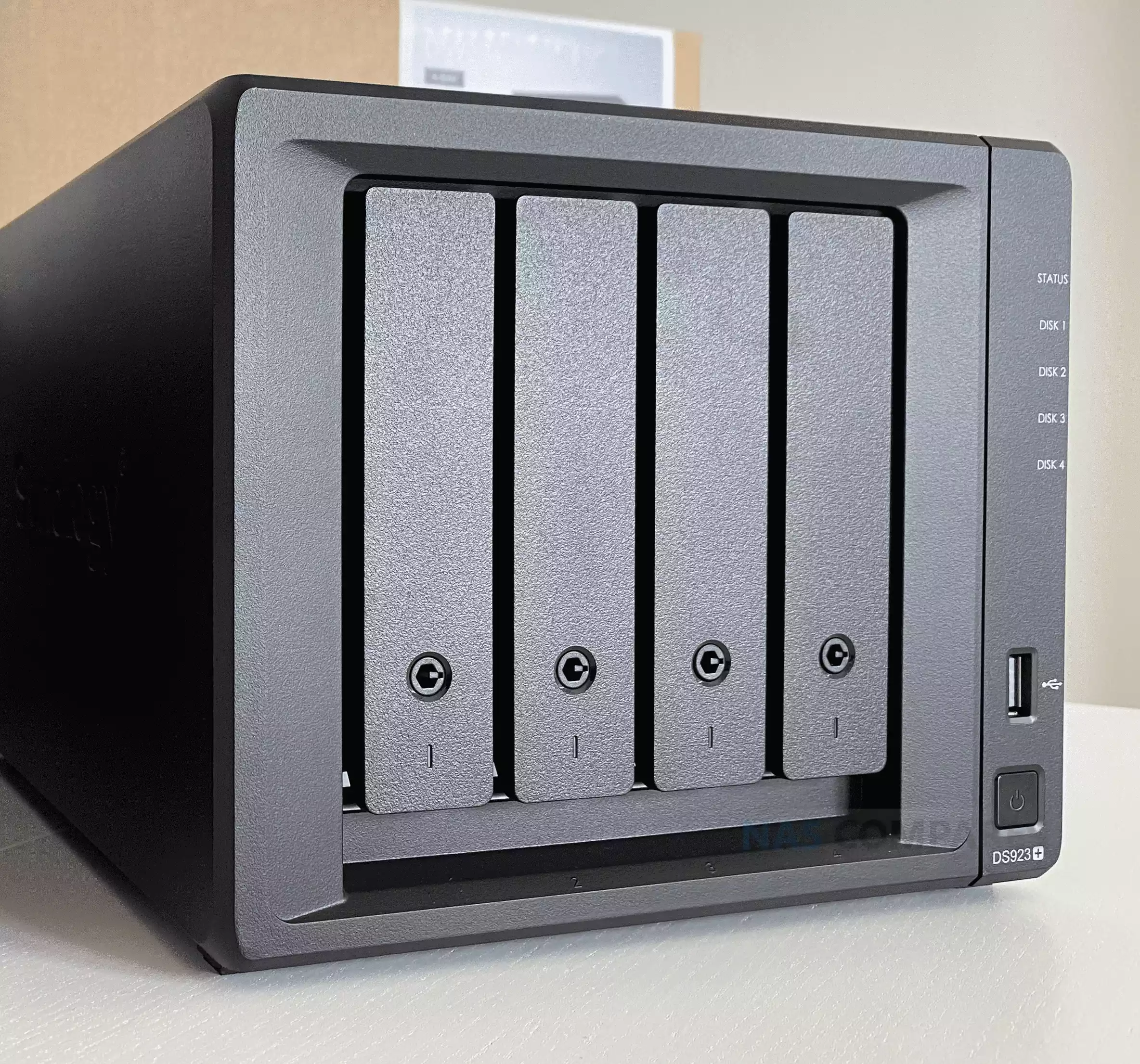 |
|
| Synology DS923+ PROS | Synology DS923+ CONS |
|
|
Need More Help Choosing the right NAS?
Choosing the right data storage solution for your needs can be very intimidating and it’s never too late to ask for help. With options ranging from NAS to DAS, Thunderbolt to SAS and connecting everything up so you can access all your lovely data at the touch of a button can be a lot simpler than you think. If you want some tips, guidance or help with everything from compatibility to suitability of a solution for you, why not drop me a message below and I will get back to you as soon as possible with what you should go for, its suitability and the best place to get it. This service is designed without profit in mind and in order to help you with your data storage needs, so I will try to answer your questions as soon as possible.
We pool the comments on this article and the videos that are featured in it to keep all the relevant comments in one place, so take a look and see if your POV is the same as everyone else’s.
📧 SUBSCRIBE TO OUR NEWSLETTER 🔔
🔒 Join Inner Circle
Get an alert every time something gets added to this specific article!
This description contains links to Amazon. These links will take you to some of the products mentioned in today's content. As an Amazon Associate, I earn from qualifying purchases. Visit the NASCompares Deal Finder to find the best place to buy this device in your region, based on Service, Support and Reputation - Just Search for your NAS Drive in the Box Below
Need Advice on Data Storage from an Expert?
Finally, for free advice about your setup, just leave a message in the comments below here at NASCompares.com and we will get back to you. Need Help?
Where possible (and where appropriate) please provide as much information about your requirements, as then I can arrange the best answer and solution to your needs. Do not worry about your e-mail address being required, it will NOT be used in a mailing list and will NOT be used in any way other than to respond to your enquiry.
Need Help?
Where possible (and where appropriate) please provide as much information about your requirements, as then I can arrange the best answer and solution to your needs. Do not worry about your e-mail address being required, it will NOT be used in a mailing list and will NOT be used in any way other than to respond to your enquiry.

|
 |
WHY IS PLEX A BIT S#!t NOW? IS 2026 JELLYFIN TIME? (RAID Room)
Synology FS200T NAS is STILL COMING... But... WHY?
Gl.iNet vs UniFi Travel Routers - Which Should You Buy?
UnifyDrive UP6 Mobile NAS Review
UniFi Travel Router Tests - Aeroplane Sharing, WiFi Portals, Power Draw, Heat and More
UGREEN iDX6011 Pro NAS Review
Access content via Patreon or KO-FI
Discover more from NAS Compares
Subscribe to get the latest posts sent to your email.


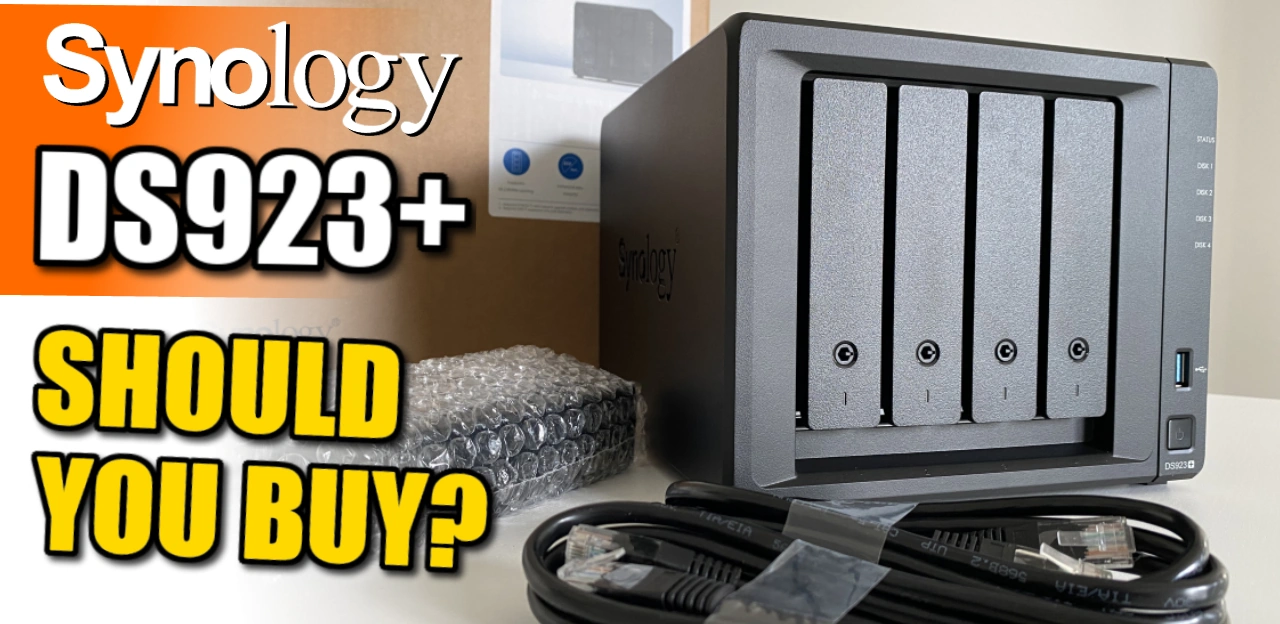
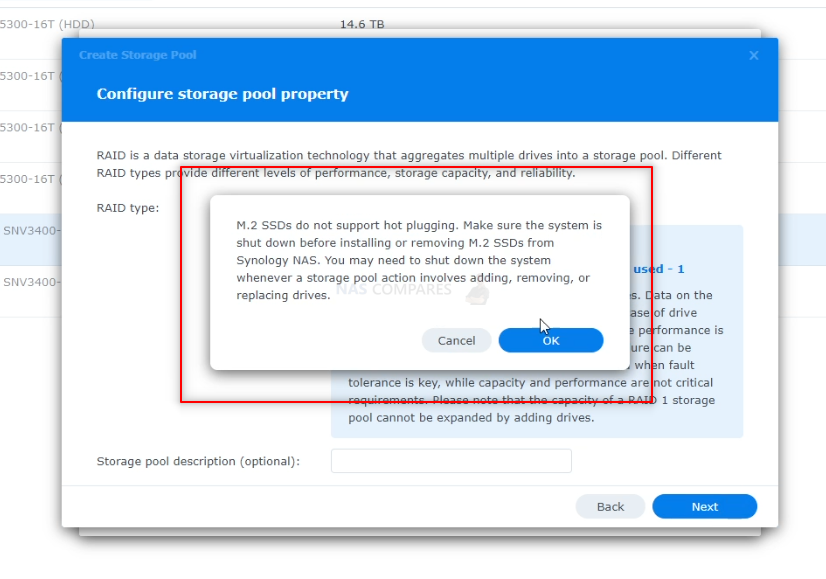
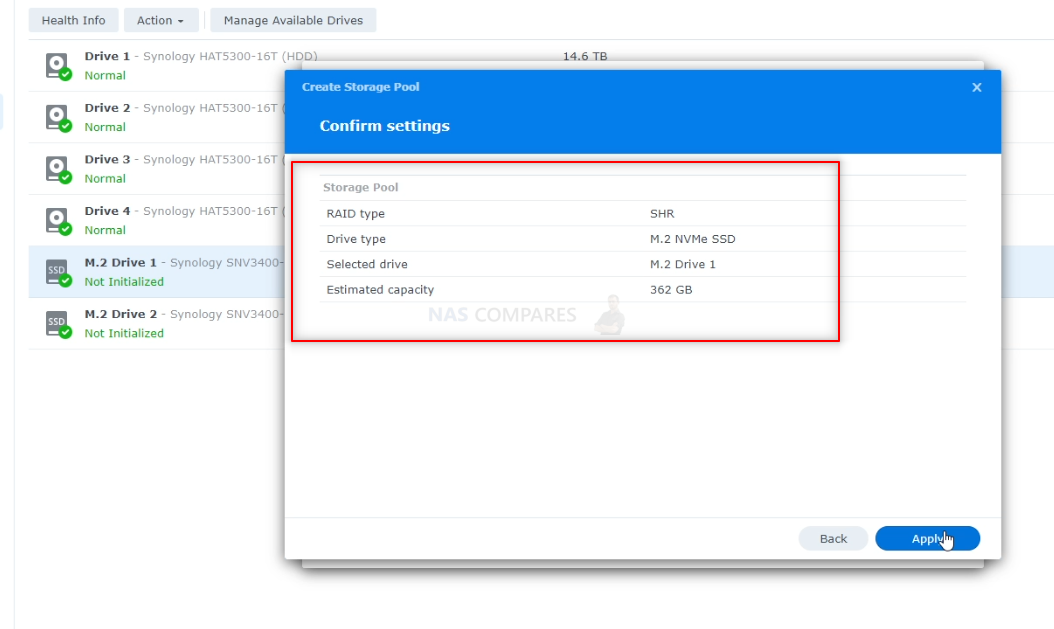
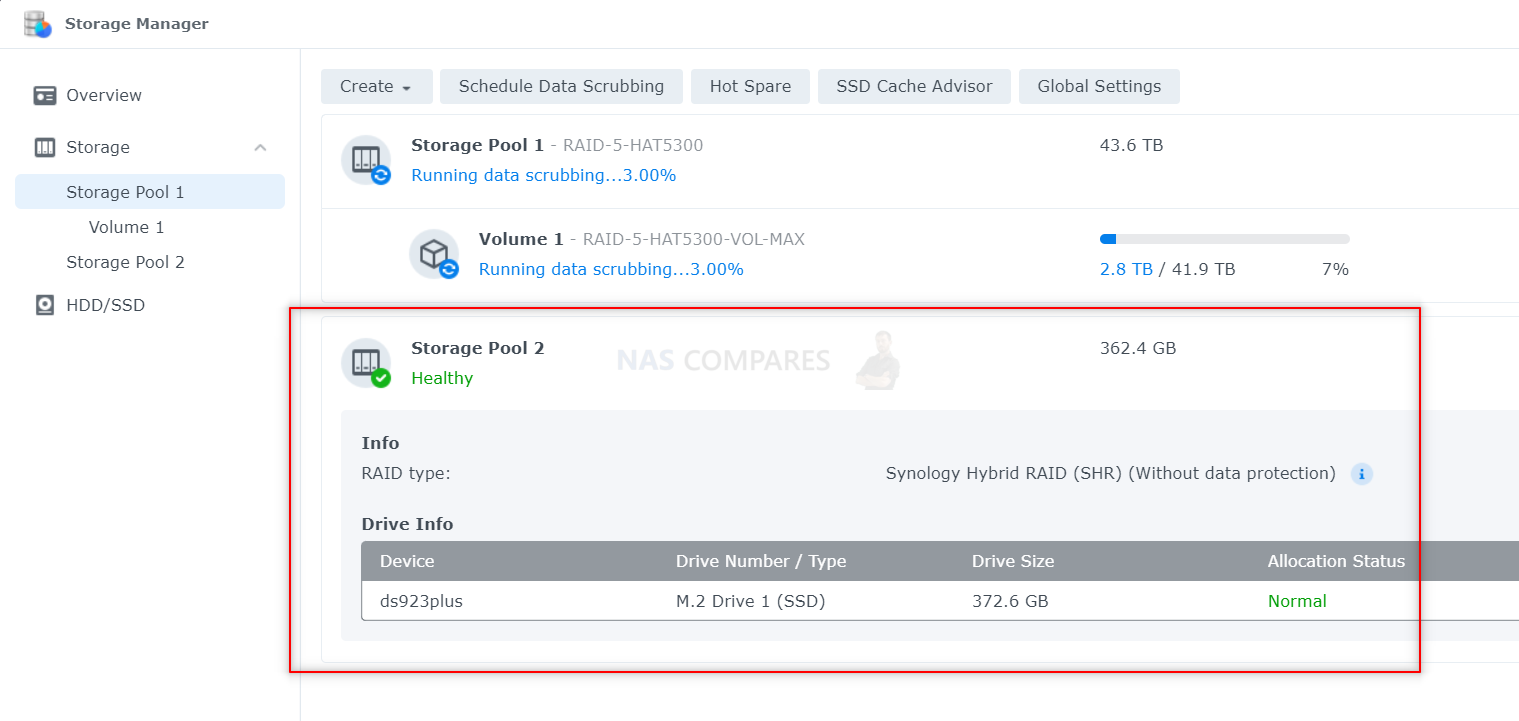
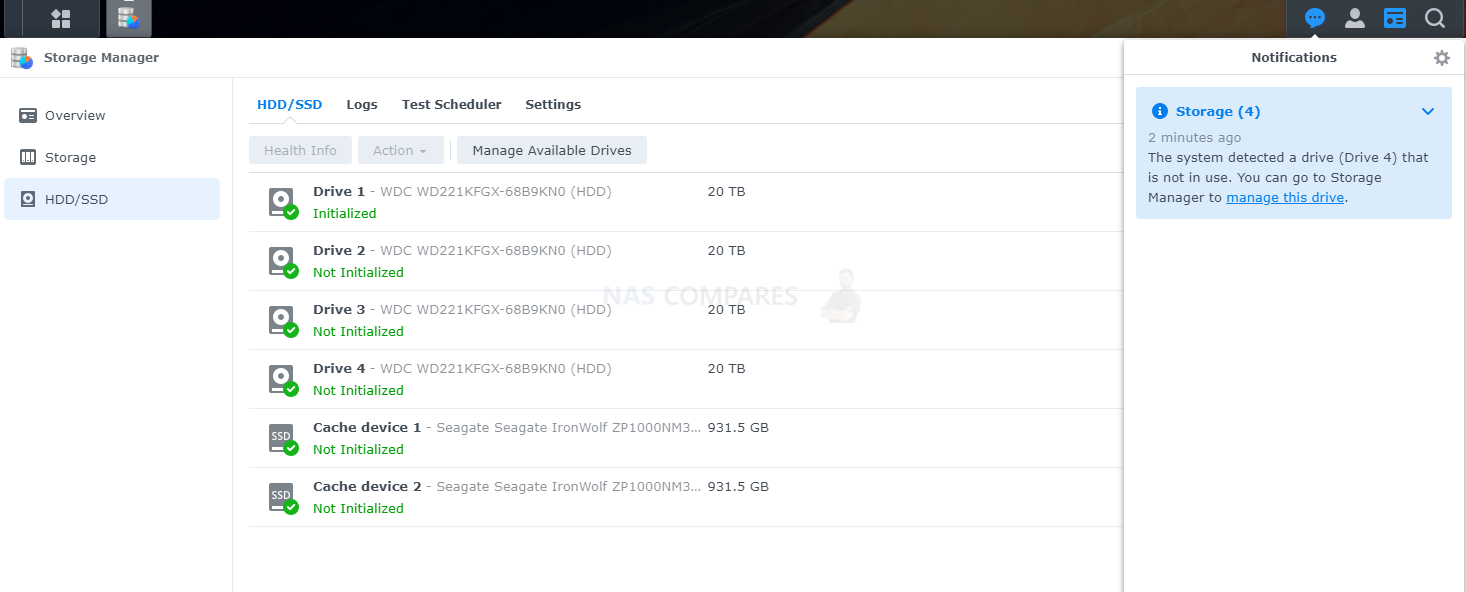
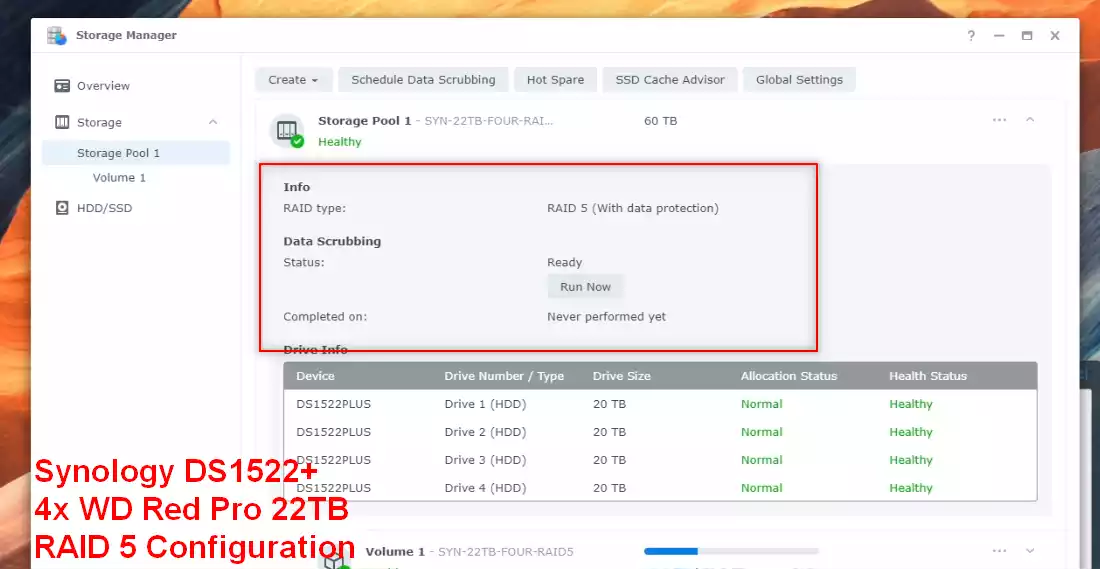
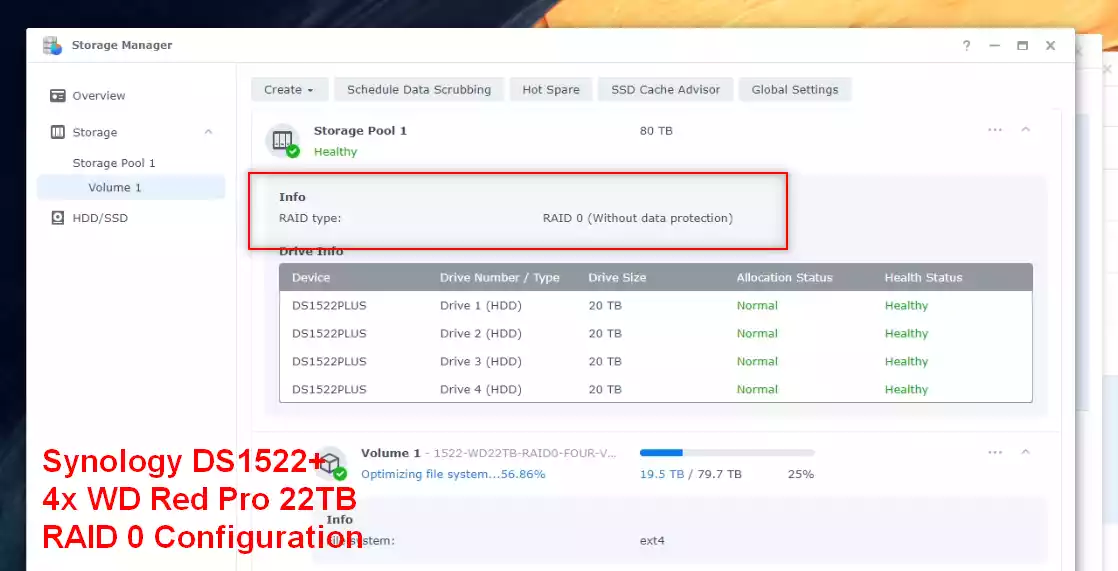
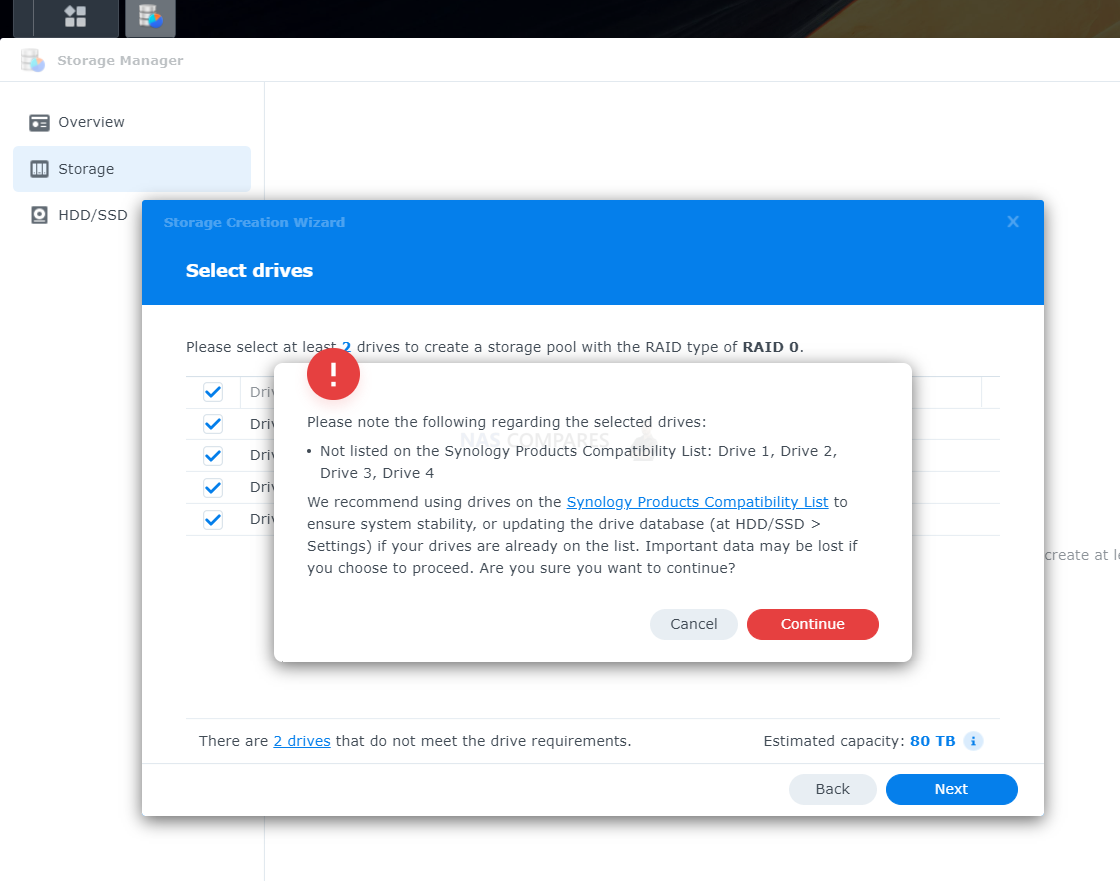
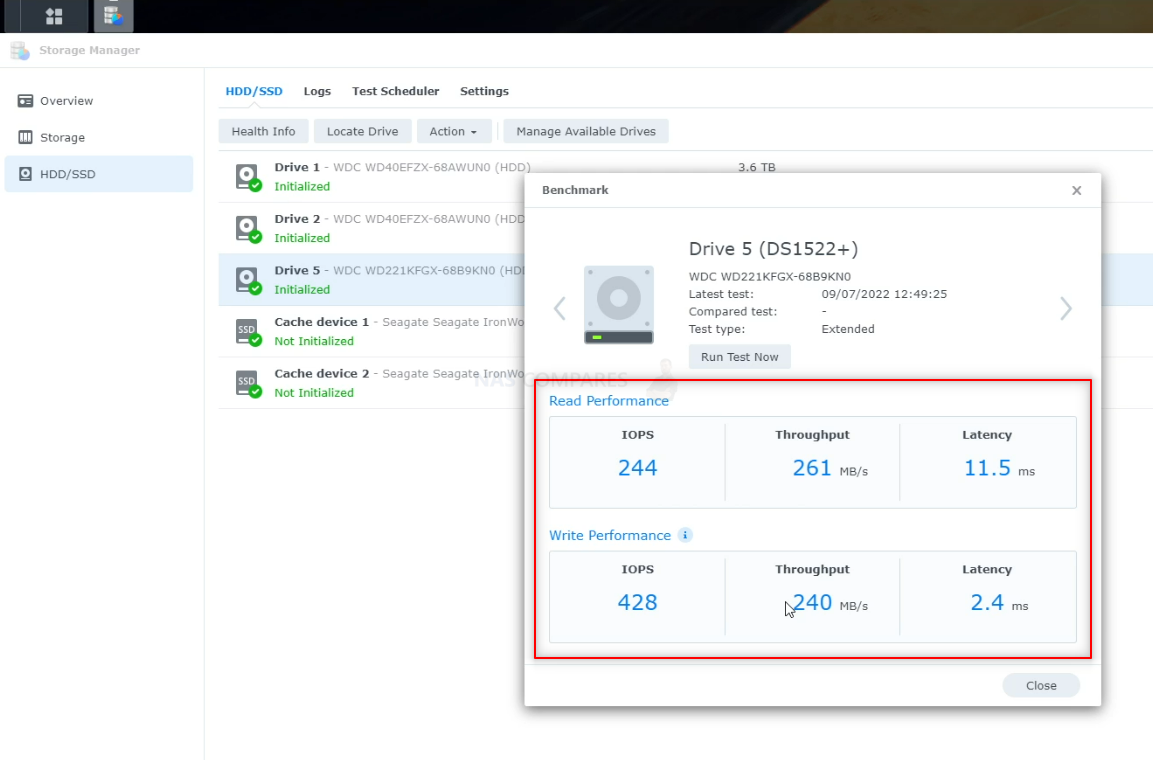










We need nases with intel 13500 cpus in them set to a low power mode to have god tier av1/hevc nas/plex all in one servers
REPLY ON YOUTUBE
Hi, I currently have the DS716+II plus expansion bay with raid 5. 3 x 8tb and and 4x 4tb drives . I plan to purchase the 923+ with the 10gbe network card. I am wondering is it worth buying the nvme ram for to speed up access and to stop buffering. Mainly use it for streaming my music but have video files also. Your views would be appreciated.
REPLY ON YOUTUBE
Do you think they’ll change their stance re non synology M2 drives?
REPLY ON YOUTUBE
does the nvme increase boot speed?
REPLY ON YOUTUBE
Sry Plex is lame, use Jellyfin, is opensource, no online account oder sub. ????
REPLY ON YOUTUBE
I need ecc for zfs. Done.
Plus, I want the power. I can stick a little cheap GPU in of needed and it’d be way more powerful.
REPLY ON YOUTUBE
are they pcie gen 3 x4 or x1?
REPLY ON YOUTUBE
Thx for this video today ssds became really cheap compaired to 1 year ago
REPLY ON YOUTUBE
Thank you for this detailed overview
REPLY ON YOUTUBE
Question some of the new models do have Intel Celeron. Do those all have the same imbedded graphics as this older model ?
REPLY ON YOUTUBE
So I do unreal engine stuff and need like 2 8tb on m.2 pci5 12gb/s available and 48tb on hard drive that I can drag back and forth to work on whenever I change projects. Can you make that video????? thank you love your work.
REPLY ON YOUTUBE
Does this work on 720 +
REPLY ON YOUTUBE
good video but unnessary streched
REPLY ON YOUTUBE
Seems like these comparisons are moot if you just connect any NAS to a Zidoo media player such as the Z9x or Z2000pro to pull the content from your NAS. Those will play anything smoothly, everytime.
REPLY ON YOUTUBE
I do not have much NAS knowledge. I want to put 18Tb video on a NAS. 80 percent 1080p. The rest is 4k and this will become more in the future.
What would you guys buy ? A 923+ or a 1621+ ? Or a different NAS ?
REPLY ON YOUTUBE
I bought DS423+ after comparison reviews from your channel, and watched this video while still waiting for it to arrive. Great job! Is someone at the door? it’s my NAS arrived!
REPLY ON YOUTUBE
Is there a NAS that has only nvme/m2? I just hate spinning disks and a NAS with m2 would be soooo much smaller and faster.
REPLY ON YOUTUBE
I still kinda want one of these.
REPLY ON YOUTUBE
where can I configure and buy one of these put together in the US?
REPLY ON YOUTUBE
Hi, I put in my DS923 2x4TB for private files, 8TB for Plex and Emby, SSD for VM…and 256GB for cashe. I just want to say that everything is working great. At first I put OpenVPN and run Plex and it was OK. Sometime it has little of lag …but today I install Emby and reallized that Emby is working much faster than Plex. I do not know what is going on but difference is significal. I run most of movies and shows in 1080o and that is OK for me. I am testing with Emby all day with or without OpenVPN and it is working great. I can say now that I am really satisfied. Synology DS 923 is very good product…. for media, file backup and many, many things. Best regards.
REPLY ON YOUTUBE
Man I haven’t watched your videos in a while and I swear you talk even faster now. It’s almost incomprehensible at times especially if you get excited. I don’t know are you on a time crunch or something? Or do you film these close to dinner time and you want to whiz through so you can eat?
REPLY ON YOUTUBE
Oh, hell, I’ve gone deaf. I can’t hear anything except this beep every now and then. Are you sure your microphones are working? Did the video sound channel copy into the video? No, I’ve gone deaf, haven’t I? Ship. Mum warned me about those airpods!
Also, were those seagulls or just really badly dying HDD I heard?
Keep-up the good work!!
REPLY ON YOUTUBE
Had this on in the background over a couple of days. This is the comment you requested — I made it to the end! =D
It’s definitely not in the budget for me yet, but I’m dreaming about a NAS in my setup in the future!
REPLY ON YOUTUBE
Hello Brother. I understood that Synology approved for use only its SSD/NVMe model, but in practice can I use it on 1522+ brands like WD SN770 or Kingston FURY?
REPLY ON YOUTUBE
Noooo no NVMe storage pools for my 1019+ 🙁
REPLY ON YOUTUBE
I just purchased the 923+ last weekend… but it’s just as a hyperbackup vault. Keeping my 1821+ as my main plex server. Wanted the qnap but as only recently moved from self-made NAS with hardware RAID cards, stayed in the ecosystem for now (it was SHR that made me go Synology rather than QNAP/Truenas ZFS)
REPLY ON YOUTUBE
I was going to buy it (I made the order and canceled it few hours later) until I discovered the new “HD compatibility list policy” and how my two WD RED that are compatible in my old Synology NAS are not in the list anymore. No more Synology products until they revert this stupid policy and the path that their are taking with these actions. Good way to ruin the reputation of a good company.
REPLY ON YOUTUBE
Seaguls playing with your lights now?
REPLY ON YOUTUBE
Thanks God I have ordered yesterday DS220+ with SSDs 🙂
REPLY ON YOUTUBE
I don’t understand why you would not want to optimise your CPU performance with SMT. It’s basically just saying you’re happy to have your CPU sitting idle instead of working, for a slight improvement on task completion times.
REPLY ON YOUTUBE
I don’t know but boosting the levels by 50% just confused me more now. Why not just record it 1 meter away and perhaps talk in between for reference, then idiots like me could estimate the disturbance levels. When hearing the enterprise HDDs at 50% boost level, scares the shit out of me. I just canceled my order for HAT drivers.
REPLY ON YOUTUBE
I find my 920+ to be a bit of a noise maker with 4x 8tb Seagate ironwolf drives it keeps humming away with some disc search sounds or something at random times and it annoys the missus big time
REPLY ON YOUTUBE
I have followed you for a long long time, and i have been running truenas/freenas and now i wanted to switch to a smaller box, for a apartment homelab.
I got the 923+ becuase of its ryzen processor, more importnat for the pcie lanes it offers and for ecc ram.
While it seems that the market is big and there are a lot of choices, there really arent many for a 4 bay nas, there are the qnap 464, terramaster whater that have the celeron cpu and nvme that runs at x1 .
The only other variant is the qnap 473a that has a better cpu and faster network + ecc memory , but it’s much more expensive.
So for that the ds923+ seems to be my choice.
Please continue with your outstanding work !
REPLY ON YOUTUBE
Does it support samsung 970 evo m2 for storage pools?
REPLY ON YOUTUBE
Can you repeat all of that in English now?
REPLY ON YOUTUBE
I’ve been waffling between the 923+ and the 423+. I didn’t really need the transcoding so the 100 US Dollar difference was decision factor. However, March 31, 2023 both Amazon and B&H Photo dropped the price for the 923+ so it is 10 US Dollar more than the 423+. That made the decision, order placed — using your link. Hopefully that worked.
REPLY ON YOUTUBE
i did watch the whole video
REPLY ON YOUTUBE
I think a company which regularly updates its product every 3 years doesn’t make a solid lasting product
REPLY ON YOUTUBE
If Synology introduced nvme storage pools capabilities, would you recommend a data redundancy/fail over?
REPLY ON YOUTUBE
My ds918+ just broke – should i buy this one and can it migrate my disks?
REPLY ON YOUTUBE
Is there any update on whether this is coming to the 920+? I”ve just bought one and considering returning it…
REPLY ON YOUTUBE
I think I bought my last Synology NAS last summer. The sheer wisdom of Synology to not accept other manufacturer’s nvme drives and to not support 2g5 or 5 Gbps as standard is unacceptable. It’s a solid OS , I’m using it since my first ds-101. I’m feeling a bit sad to know that I have to switch. I just have to.
I love the attention of you for the streaming aspects like Plex support. I think you were way to kind on this 923+, though. Air flow , ECC etc don’t make up for the short comings.
Clicked the bells and I keep following you. Thanks.
REPLY ON YOUTUBE
Great content! Thanks for your time and experience!
REPLY ON YOUTUBE
If (just) serving up and backing up files, do synology nas NVME cache benefit from uber speed (7k MB/s) vs. 5k or 3.5k?
REPLY ON YOUTUBE
I am thinking about buying one of these and this Video helped me. Unfortunalley I am buying from a smaller companie in Germany.
REPLY ON YOUTUBE
Why can’t Synology get with the embedded graphics program! If QNAP interface and software was more user friendly. Synology would really have problems.
REPLY ON YOUTUBE
Give me a Synology NVME only NAS!
REPLY ON YOUTUBE
I’ve seen reports of using the read-write cache option causing the entire raid volume to crash if an ssd fails, so I’m personally going to be sticking with the read cache only.
REPLY ON YOUTUBE
3:03 a few hundred what?!?
REPLY ON YOUTUBE
Hey guys – really good video. I really researched this topic a lot and decided against the 923+ or 723+ due to dual core and no embedded graphics. I will tell you though, the the 1500B Ryzen in the RS1221+ is a beast. It is by far the fastest NAS I have. My RS422+ has the Ryzen 1600 in it and I’m not super impressed. Most home users are not going to benefit from 10GBE yet because everything else in the house runs 1GBE or less. I’m sticking with the DS920+, DS720+, and RS1221+ for now and skipping the 23+ series. I think Synology really let us down on this one. Also, the hard drive selection on these from the QVL is getting stupid for something that crosses between home and business NAS for the home user who wants more power.
REPLY ON YOUTUBE
“Giant BBC” eh?
REPLY ON YOUTUBE
I just purchased a 723+ and a pair of 12TB drives. Did I make a mistake? What would you purchase instead, staying in the Synology family, DSM is the requirement. I am not going to use Plex ever, It will be mostly used for personal cloud and Synology Photos for local management of my family’s photos’ and videos.
REPLY ON YOUTUBE
How this doesn’t have more likes is unjust. He covers so much and shows great examples. He also has time marks for reference. Great resource! Keep up the good work, would give you more likes if I could.
REPLY ON YOUTUBE
One thing I wish sonology would do especially further backup program is allow you to back up to a networked windows pool drive aka the NAS sync with networked multipooled Windows drive giving you to a form of backup even if you cannot see the data on the Windows pool that be fine if it was just an encrypted image or better yet allow the damn system to read Windows pool drives…. You’re plugging a USB hub with all your USB drives the nas makes its own virtual pool out of those drives and then it backs up just in case there’s nobody has a single 60 terabyte drive …. The fact that most people are coming from multiple hard drives externally to Nas and can’t use those multiple drives as a single pool backup is annoying especially when there’s hard drive crashes or or anything like that at least you’d have a personal backup I didn’t even pay 10-15 dollars per drive one time fee to make a pool for image backup
I literally had to Jerry rig using always-sync to back up the entire NAS drive on a 9 hard drive pool on the Windows side
REPLY ON YOUTUBE
Insert the biggest thing I hate about Synology outside of their “hard drive requirements” (if the damn hard drive says Nas supported then it should just work you shouldn’t need a specific hard drive) is them telling you where to put your media or files for specific programs they own you should be able to tell the programs just like in Plex where the files are where you wanting to put the files and have one way think as an option with no deletion
REPLY ON YOUTUBE
I personally find it difficult still for a novice user especially for making user accounts … Aka having public and private folders for individuals in a group setting (you can’t have both) we’re in the group setting everyone has the rules AKA right and no delete for public folder and the ability for only individual users in that group to only see their private folder and not everyone else’s
Aka private “Jon” public “all” private “Sarah”
John can still see Sarah’s folder
Because I haven’t nested in an outside folder public and an outside folder private where all their names are in the private folder so it’s nice and organized
But everyone can still see everyone’s folder I’d love to have it so that you can easily isolate nested folders
REPLY ON YOUTUBE
One application they should make is a network photo slideshow screen saver picture frame app with dslp and outside network
REPLY ON YOUTUBE
The one and only thing I don’t like about Synology multimedia apps or drive apps…. Is they TELL you where to put your media AND GENERALLY HAVE TWO-WAY SINK AS DEFAULT
Most users are going to have a plexa library that they’ve probably customized and should customize in one bulk “media folder” and then break it down within…. If you do stuff like that for all your multimedia they’re native apps don’t work you have to have it where they want it…. Same with sync you have to have it where they want it and it’s only sync … Me personally I want one-way sink data goes on the NAS … You can delete it off the phone or computer and that won’t transfer over…. They have improved the drive application but I still have to improve video photo and the other ones to be one way and for us to control the locations multiple or single nested location I don’t want to be told or you got to have it in the ” home /user /names/ photo/ to have the photo application work
NO I want to have it in plex media / photos/ cell phone 01/
REPLY ON YOUTUBE
why do I need raid 1 on the ssd cache? It doesn’t matter if the data is gone on the cache if one ssd fails. The data is stored on the HDD after a Data is altered in the read/write cache. or is written again from the HDD when a new SSD is added. So that makes no sense. Raid 0 would be better in this case.
REPLY ON YOUTUBE
Interesting news! Does this work exclusively with Synology M2 drives or can I use other M2 drives and use them as volumes?
REPLY ON YOUTUBE
I was going to buy this as my first NAS as I run a small electrical business and also run a PLEX server with only a handful (around 40 titles) of 1080P MKV files.
I use my laptop for my business use but, as my business and client base are expanding, I’m finding I’m maxing the storage capacity of my laptop which now runs like an old Ford Cortina where it once ran like a Ferrari.
My current PLEX server is an Nvidia Shield (2017) so I guess I could use that to process any transcoding etc etc.
I would use 3 x 6TB Toshiba M300’s in a RIAD1 configuration which I feel would be ample space for at least another 5 years or so.
I do plan to create more MKV files but only in 1080p although I do own an LG C2 OLED so 4k is do-able….
Any thoughts??
REPLY ON YOUTUBE
Thanks! I’ve gone through a myriad of sites to gain an understanding of available NAS options, and your site is THE ONLY site I’ve found that will allow me to spec out the components of my NAS properly – in other words, the confidence to “know” that what I “think” I know about the service levels I’ll receive from my NAS, is actually what I “know” I’ll receive from that NAS. Nothing worse than knowing that what you thought you knew, you now know you didn’t really know. (unless you’re inventing a new light bulb or something). Marketing brochures only get you so far…
REPLY ON YOUTUBE
Lol one of the first real tech reviews I’ve seen. Giving a real review with real pros and cons not “fake positive cons” really help solidify the information as being useful. Great job
REPLY ON YOUTUBE
Just upgraded from a DS1812+ recently and ended up with DS920+ instead of the 923+ purely because Synology opted to use an iGP-less chip for the new generation. There are ryzen embedded chips with igp. So disappointed with Synology for cutting out the igp in their new prosumer models.
REPLY ON YOUTUBE
@nascompares Now that DSM supports M2 for storage and cache is it possible to do both at the same time? E.g. put 2x4TB in the DS923 and use 4TB for cache and 4TB for data storage? Both in mirrored partitions
REPLY ON YOUTUBE
What 3,5 drives would you recommend to be as quiet as possible. NAS will be located around 3 meters away from watching/media center position?
REPLY ON YOUTUBE
Awesome. Keep it up buddy.
REPLY ON YOUTUBE
can you use NVME as a volume drive
REPLY ON YOUTUBE
Features important for me:
– Immutability
-Object Store
– Scale out / Web Scale
– 10/25Gb Support
These are all features that are requred for large scale Backup / Archive, we have them using other very expensive enterprise solutions, but as an entry level system for medium size clients would be cool.
REPLY ON YOUTUBE
So does this mean instead of the 2.5 or 3.5 HDD drives bays for storage , we will be able to use NVME m.2 SSDs for faster storage speeds ? Or is it just casheing? So is this a new NAS system enclosure they will be releasing or is this a current model that will get a update ? I’m confused . Sorry I’m new to this,
REPLY ON YOUTUBE
Something that I don’t think has been mentioned is physically transferring HDDs from an older Intel NAS to the DS923+. I believe you could transfer drives from, say, a DS918+ to a DS920+, but will drives from a 918 be accepted in the 923 considering it’s a Ryzen CPU?
REPLY ON YOUTUBE
I am a Sports photographer, and I’m gathering more and more external drives as time passes, so it’s time to go NAS. Which one would be the best for photographers? Just to put the files, and have security on it? I spend around 6/8 TB per year. Using 2021 27’’ IMac. I need fast reading as I work the photos inside the external drive not in the computer main drive. Cheers. Happy new year
REPLY ON YOUTUBE
Interesting, as I was just looking into getting a NAS after my external classic HDD is taking too long to get going. Anyhow, the first thought I had was, “Can I use m.2 drives to make a NAS even faster?” Turns out – NO. Next thought was, “How about using an adapter from m.2 to SATA?” That said, is that not an option? Thanks.
REPLY ON YOUTUBE
Thank you for this Video!
REPLY ON YOUTUBE
Thank you! Is there good Nas that fits only SSDs?
REPLY ON YOUTUBE
synology will lost their market
REPLY ON YOUTUBE
Says my kingston m.2’s are not compatible, so cannot initialize them. Only the expensive synology 400 and 800GB are on their compatibility list. Is there a workaround?
REPLY ON YOUTUBE
Looking to upgrade my NAS, but I don’t know man. I think I’m done with Synology. They just seem underpowered and overpriced these days. They have a bunch of models, but none seems to be a good value anymore. At least for me.
REPLY ON YOUTUBE
Thanks
REPLY ON YOUTUBE
Funny how that Security Advisor isn’t barking at you for having the standard 5000 and 5001 ports in use. Mine’s been yelling at me 24/7 about it.
REPLY ON YOUTUBE
I’ve been using an NVME storage pool on my DS918+ for nearly two years now — which needs some command line volume creation — which is absolutely brilliant for VMM and Docker use.
REPLY ON YOUTUBE
That really is an in-depth and thorough review. I’ve had the DS1621+ for about a year and you’ve helped explain what some of the apps actually do. Thank you.
As a photographer using Lightroom to manage my my photos, I still cannot understand why I need Synology Photos or S Video to manage them?
REPLY ON YOUTUBE
Thank you for the detailed review. I am interestedin buying a new Synology Nas (920+) and i own an old XP 32 bit PC do you think there will be any issues about compatibility from Win XP 32 bit to the DSM 7.1 Synology NAs, in that case does any workaround exist?
REPLY ON YOUTUBE
Is it also available for DS3018xs? It has PCIe expansion card for adding 2 M.2 NVMe drives. Would I be able to create RAID 1, if buy the Synology branded M.2 expansion card?
REPLY ON YOUTUBE
According to cpu-monkey and Geekbench 5 the R1600 is even slower than the J4125 in multi-core benchmark. That makes sense since hyperthreading / SMT can not make up for real cores. Also considering the high power consumption, I think it’s the wrong choice for this kind of device.
REPLY ON YOUTUBE
That was very helpful, thank you! I’m looking for a NAS that will enable me to do video intensive video editing of 4k h264 files. I will do that on 2 macs (imacPro 2017 and MacStudio 2022). So I assume 10GbE is a must have for a NAS. I don’t need all that much storage space because I archive most of the stuff that I finished working on.
Do you think the DS923+ is the way to go, or would you recommend something else?
Any help is greatly appreciated. For a layman all the NAS options seem a bit overwhelming.
REPLY ON YOUTUBE
Synology could have used 1605 chip with integrated graphics and had AMD hardware transcoding for a couple of extra dollars, instead crippled the DS21,22,23+ models for plex
REPLY ON YOUTUBE
I’m the one who watched the whole thing! And some bits twice. Very helpful in trying to decide between a Synology DS923+ and Qnap TS464. Synology seems to have the upper hand software-wise which I suspect carries more weight for a home user than the superior hardware of the Qnap? Thank you for providing this extensive review!
REPLY ON YOUTUBE
Maybe I’m missing something? I run a synology nas and use the infuse app for apple on all my apple 4K’s for media streaming. What am I missing out on not running plex? I’m guessing all the magic is happening inside the phone or Apple TV because my nas or media never lags when watching 4K hdr10 or Dolby vision title. Seems like so manny people worry about plex performance is this just because they don’t use Apple devices? I tried plex it was pretty bad at stream when the nas needed to decode or whatever.
REPLY ON YOUTUBE
Does NVME Storage Pool works via Synology NVME Drives? Can I put Samsung or Crucial NVME Drives in it?
REPLY ON YOUTUBE
My dude, another spot on video – can guarantee you have helped more than one person make an informed decision.
I have been holding and holding with my 214play (bleh) to see what XXX23 brings and it looks like XXX20+ is still the answer for the prosumer/transcode user.
Perfect level of information and impartiality (I’d call the new releases a hot steaming pile, but that’s just for my use case) – lets hope they’re not gearing up for a quad core DS923+Play++GOTYE+Platinum+++++ with an onboard graphics!
REPLY ON YOUTUBE
….is there an alternative new nas with embedded graphics?
REPLY ON YOUTUBE
I just read your article about this. Thanks for testing! Storage pools only availble if you use the overpriced Synology SSDs and even if you do so, no possibility to use them as boot drive for DSM. Overall the DS923+ is a joke and partial downgrade to the DS920+. Even the CPU seems to be slower despite consuming more power since it’s only a dual core while the J4125 is a quad. Synologys policy reminds me of Apple.
REPLY ON YOUTUBE
Looks like Synology have discontinued the 920+ for some reason (no longer on their website) so looks like no option but to purchase 923+ now for the normal person maybe have to find another brand instead (was looking for 920+ on a Black Friday deal but seems no one really offering it. Oh well time for re-think on what to do now
REPLY ON YOUTUBE
Looks like Synology have discontinued the 920+ for some reason (no longer on their website) so looks like no option but to purchase 923+ now for the normal person maybe have to find another brand instead (was looking for 920+ on a Black Friday deal but seems no one really offering it. Oh well time for re-think on what to do now
REPLY ON YOUTUBE
So how will the 923+ handle surveillance station without the embedded GPU? 6 x 4K cameras for example. Is this going to be able to record and handle remote viewing on i devices? Better or worse than the 920+? I don’t have or want plex, just curious about the surveillance video aspects.
REPLY ON YOUTUBE
This is not a review but a sales pitch. Stick to FACTs and not hopes or suppostions. Very disappointing ‘review’, with little mention of the Synology lock in of added gear to make it work. No 2.5 or 10G network as standard. What a joke.
REPLY ON YOUTUBE
Awsome information. Now please a similar video on Qnap. I cant make up my mind as I need both photo management and video surveillance. It seems like Qnap and Synology takes 1 point each.
REPLY ON YOUTUBE
Jellyfin?!!! Most channels that review media server software, either only deep-dive their preferred offering, or only give an overview compression of the field. If someone like you, who can give the same enthusiasm creating two videos deep-diving two NASs that only differ by a drive bay, puts that into a spin-off series on a topic that is close to a large chunk of your demographic, that would be a real treat.
REPLY ON YOUTUBE
քʀօʍօֆʍ
REPLY ON YOUTUBE
that would be really awesome and also could justify use of 10Gbe on smaller (less bays) NASes,
NVME SSD offer superior performance even on 1Gbe with tons of small files operations indeed 🙂
REPLY ON YOUTUBE
Just got myself 920+ after this video
REPLY ON YOUTUBE
Thks & I just watched it again & most excellent;
I’m a retired physicist & have no real problem understanding the infinite details.
However my problem is how to keep it simple & stupid (ex: high tier levels of simplicity, brevity, encapsulation, etc).
Oh with my goal is to sociably knit-together all my family, relatives, friends, etc on my synology NAS.
Unfortunately I’m going to be Mr Tech support for them. Sooooo I gots-tos keep-it-simple is an understatement & I will be abused (I says anything for family/friends though ;).
REPLY ON YOUTUBE
I’m also only seeing 360. Can’t make out any screen. text
REPLY ON YOUTUBE
you give such great info thank you so much.
REPLY ON YOUTUBE
I was waiting for this to replace my aging DS412 which cannot run VM’s or Dockers which I need to install Home Assistant (home automation). However, a 2 core CPU does not mesh well with virtualization (I agree that threads are not cores …). The lack of a 2.5 GB ethernet port and the higher power use are just the final nails in the coffin for me, I’ll be skipping this model and hang on to my DS412 for the moment …
REPLY ON YOUTUBE
Too bad I own a 918+… However, I wish in the future we are offered super compact NAS system (the size of an old VCR cassette or even a cigarette pack) with only NVME slots (4 or 8) and one or two 10Gbe ETH ports. It’s not only about performance: I need a 100% silent NAS. And also an extremely low power comnsumption one. In a couple of year it’s possible SSD drivers are going to cost the same as mechanical ones, per TB. When 16TB NVME are out, I think mechanical disks are dead.
REPLY ON YOUTUBE
Until now, I have no NAS, so please forgive this silly question, but wouldn‘ t it make sense to install DSM for better performance on a SSD?
Could the M.2 NVMe storage on Synology an option to run DSM on it?
REPLY ON YOUTUBE
You’re a DSM PhD;
I never hear so dense of a presentation of great DSM info & my head is still spinning, thks.
Next-time, you think about having something good to drink every-once in a-while.
REPLY ON YOUTUBE
47:05 Where, When
REPLY ON YOUTUBE
Still only 360p for me
REPLY ON YOUTUBE
Still just in 360p
Hope it will fix soon.
Thx for all the effort!
REPLY ON YOUTUBE
Watched you video from begin to end! Loved the deep dive into DSM, since I am looking into buying a new Synology. Keep up your amazing videos!
REPLY ON YOUTUBE
Nice video. Does anyone know why my USB printer doesn’t work anymore on my Nas Synology ?
REPLY ON YOUTUBE
PCI-x Gen2 has 2Gbit per second bandwidth, and that is a million miles beyond any sniping rust speed, not to mention IOPS. So there is no reason for Synology not to enable this in DS920+, but greed (if you want it buy new hardware).
REPLY ON YOUTUBE
Thanks for a great video. Really explains what everything is. Recently got my NAS and been already updating hard drives in it. It will mainly be used as a PLEX Server but already considering what i will do when i start upgrading the smaller drives in it. May consider another NAS and use it as strict data back up and maybe a synology Drive / synology Calendar and Email setup. Move my calendar off Google’s stuff. We will see If i do that at some point. Great job again
REPLY ON YOUTUBE
So, not only is it missing 2.5gbps, and has a proprietary insert card for 10/5/2.5 wich will cost closer to 100-150 euro, it requires their OWN EXPENSIVE DRIVES.
Im not expecting the “base” ds923 (none-plus) to support essential features, like the expansion card, virtualisation, ram upgrading.
They are going to force people who have a 920+ or similar to switch to another manufacturer all together.
Synology is greedy and will loose alot of favor in the home user department, wich in long term will hurt them as people dont get used to their software/hardware early.
REPLY ON YOUTUBE
Thank you for all the work you put into this. Very helpful.
REPLY ON YOUTUBE
So, I should get the DS920+? I just want a Plex server? or should I convert my Mac Pro mid 2012 (upgrade Ram and Hard Drives)? I was waiting for this NAS and it seems like a short term win, but midterm problem and longterm loss.
920+ for me !! , I some times I do not understand Synology ?! just upgrade the Intel Cpu with 4k support and you have ours wallets !!
REPLY ON YOUTUBE
I dont really like these 5 reasons videos. Just tell me what is good and what not.
REPLY ON YOUTUBE
It’s not a bottleneck if they enable it on 920+. There is no way to get connection to these NASes that exceeds 2GB/s 🙂
REPLY ON YOUTUBE
My English man!!! What a video! Greetings from Greece! I really appreciate your hard work and that content. I have a DS 1520 + and I am not regretting getting it although the new 1522 is out. You have my admiration. Keep up the professional and good work.
REPLY ON YOUTUBE
Why only 360p is showing ????
REPLY ON YOUTUBE
Would it be too much to expect something similar for QTS?
REPLY ON YOUTUBE
Why 360p? Can’t see it clearly.
REPLY ON YOUTUBE
Wow ! What an episode – a full tutorial for everything ! A one stop shop – Thanx Robbie ‘ol mate !
REPLY ON YOUTUBE
Yes was wondering why its. 360p till saw the comments
REPLY ON YOUTUBE
*Important* Interested in the software that the Synology DS923+ NAS Arrives with? Check out my MASSIVE Synology DSM 7.1 Software Review HERE – https://youtu.be/SqFa0WyxGJc
REPLY ON YOUTUBE
*Note* – Regarding picture quality, this is a BIG video (so many features to cover in a single video) and YouTue can sometimes be a little slow to process HD and 4K uploads, so if this video is in low-quality for you, maybe come back in an hour or so, as YouTube should have finished processing it and have the 4K, 1080p and 720p versions done. Thanks for watching and hope you enjoy the review of Synology DSM 7.1, featuring the DS923+ NAS.
REPLY ON YOUTUBE
Honestly the PCI-E gen 2 argument is kind of moot; sure it won’t give you the full bandwidth of the SSD… but at the same time, it would still not be bottlenecked on things like VM’s or other docker containers, it’s still worthwhile having. I’m more interested as to whether you can use the solid state drive with multiple partitions; having a mix of storage and caching by using a relatively large drive.
REPLY ON YOUTUBE
Which NAS do you recommend for complete noobs who just want to backup and synchronize data from their desktop pc and Android phone? Want it to be simple like drop box.
REPLY ON YOUTUBE
Thks, NAS Nerds
REPLY ON YOUTUBE
Thks
REPLY ON YOUTUBE
Ryzen R1600 , Why would they use this Chip ?
Chip came out in Feb 2020, I can’t find Price for Ryzen R1600 , If someone can find the Chip Price I am sure it would be cheap by now.
Please Post the Price,
I bought a 1522+ Installed 10Gb Network card , I like the box doing Backups no Plex so Graphics not hurting me , HyperBackup across VPN to another Synology Box
30+ Workstations Bare Metal , 40 Mailbox Backups, What helped I bought 2x 2TB NVME Gen 3 Crucial drive, in a Read Write Configuration. Number of Files is 15 Million + takes a awhile to count these files. I have it hooked up to Netgear 10,5,2.5.1 Switch. Server has 10GBNics Workstation 2.5Gbe Standard with Workstations now. Even Lowest Intel Nucs have 2.5GB Network cards.
Even with this I don’ use 4GB Max Ram on This Box Comes with 8GB ECC Ram. Why use faster Chip , I just see Synology trying to save $$ on Hardware. Can this box Max out
Hard drives not sure. When I backup my VMware Server for Incremental takes about 2.5 mins.
People cry about this not being fast enough . I am happy with the 1522+ , I looks like you could have 2x 10GbE if Synology wants to.
Is Qnap ahead in some ways yes they are in the Hardware side , Before Synology I used Qnap Worried about Security on Qnap.
Ryzen R1600 Last Time Buy 2029 from AMD So this chips will be around for sometime in the future for Synology. I would say at least another 3 years , then 3 years later maybe for the low end Synology boxes that will come in the future .
Comments Welcome
Specs Below
Ryzen Embedded R1600 is a mobile processor with 2 Cores, launched in February 2020. Embedded R1600 on a 14 nm production process TDP of 25 W , SoC Features
Ethernet: 2x 10GbE
USB: 2x USB 2.0, 4x USB 3.1 Gen2
SATA: 2x SATA3
Ethernet 2x 10GbE
PCIe® Lanes 8L Gen3
TDP 12–25W
REPLY ON YOUTUBE
Is that a D-Link 6-Port 10GB & 2.5GB Unmanaged Gaming Switch in the background? did you guys do a video on it? would love one if you didn’t
REPLY ON YOUTUBE
????????????????????????????????????????????
REPLY ON YOUTUBE
This „before you buy“ helped me alot. Conclusion for me as multimedia guy: wait and hope that Synology will release a DS with integrated GPU or looking to Qnap and hope that they make their NAS SW secure regarding Cyberattacks… But how long do I have to continue waiting for that …. Maybe another two years ????????
REPLY ON YOUTUBE
Would love a DS0+ 2 NVMEs!
REPLY ON YOUTUBE
Looking forward to being able to use Samsung 990 Pro Gen 4 SSD’s in my Synology web server!
Just wish I could get a decent CPU in an affordable system to handle the web hosting I do with mine… Thanks for the great videos…
REPLY ON YOUTUBE
AMD = shit
REPLY ON YOUTUBE
Need for DS918+
REPLY ON YOUTUBE
Hope my old DS918+ will be compatible with this. Thanks for the video mate.
REPLY ON YOUTUBE
Great job covering some of the possible Synology created pitfalls. Anyway, this gives some (a little) purchase to Syno’s push for 10GbE over 2.5GbE in its offerings (I still think they should have had 2.5GbE for consumer models).
REPLY ON YOUTUBE
It seems that users of Synology NAS devices have also finally had their time ???? I’ve been using M.2 NVMe modules on QNAP NASes in RAID as very fast data volumes moreover for VM (+ GPU) for many years now, and as I watch, I’m glad I switched to QNAP. Still waiting a few years for Synology to introduce something is quite a hassle ????
REPLY ON YOUTUBE
from a tech standpoint there is no reason not to enable pci-e gen 2 bays for storage.
pci-e gen 2 offers 2gb bandwith, (net a bit less of course) but that is still 10 times faster than sequential read/write of hdds.
nvme-disks may offer a bit higher sequential read and write in theory but for one you cannot utilize that speed even with a 10gbit connection and even if you could, you will tax the ryzen r1600 quite a bit with a maxed out pci-e gen3 raid setup. the chip is much more capable than the celerons before when it comes to io, but it still is only 2core/4threads at fairly moderate clock speeds.
in practice there is very little advantage for this kind of hardware between pci-e gen 2 and gen 3. what we really want are the iops and those are not hindered by pci-e gen2.
load times will be greatly improved and with this announcement a tiny windows vm that does not require a lot of compute but profits of fast disk access becomes a real possibility combined with the up to 32gigs of ram. imagine a small business that runs e.g. the accounting database for shared access on a 923+ (i’d have loved to have seen the 4core 8 thread amd chip for that very reason, it would have made this from a good into a great soho setup).
REPLY ON YOUTUBE
Really exciting! Great video, as always! I think with PCIe gen 5 becoming mainstream (4GBps per lane!) it would be cool to see what that would mean for all-NVME NAS builds. Even a relatively modest 16 PCIe5 lane slot could theoretically support 16 drives at “ok” speed or 8 drives at excellent speed, and that’s not even counting M.2 slots built into the board!
REPLY ON YOUTUBE
Another strange decision from Synology. This will annoy far more than it impresses because those that want this but need more drive slots will be left out and those who have recently bought other high end systems will be screwed over.
REPLY ON YOUTUBE
According to the spec sheet the NVMe SSDs can be used for “additional storage pools.”
The Synology DS923+ is a capable 4-bay NAS solution that can be adjusted and expanded as your needs change, with optional support for up to nine drives, faster networking, and NVMe SSDs for caching or additional storage pools. Powered by Synology DiskStation Manager (DSM), it offers a flexible all-in-one solution for data sharing, synchronization, backup, and surveillance.
REPLY ON YOUTUBE
Personally, I’m ripe to upgrade my 5 year old NAS, but I’m waiting for a truly modernized NAS product. By this I mean, a NAS chassis not built to accommodate 3.5”drives at all. I want a new NAS that only uses smaller, next gen devices such as NVMe SSDs, the benefits being a much smaller box, and correspondingly lower power use, noise, and heat.
However, NAS makers seem to move pretty slow. It could be awhile.
REPLY ON YOUTUBE
Hopefully it does come to my 1520+ but if not oh well, its been such a rock solid NAS and does everything I need and I still have no plans to replace it.
REPLY ON YOUTUBE
Now lets hope for a 8 bay rackstation with a few nvme slots and 10gbe > Rs1223+
REPLY ON YOUTUBE
Having created another storage pool on NVME through SSH on a DS1019+ in the last 3 days (51 hours uptime) it provides a massive boost to Docker and VM’s even on PCIE 2.0. I look forward to it being native in DSM 7.2 even if it is not directly supported on my model.
REPLY ON YOUTUBE
this is great news. what about DS-1621+ and 1821+ PCIe slot NVME option ?
REPLY ON YOUTUBE
Will it support Raid F1? It seems not.
REPLY ON YOUTUBE
The way they’ve ignored what other NAS makers were doing with NVMe is yet another example of Synology embracing technology to the point where it makes little sense. It may be that they’re noticing a downturn in sales that forces them to act.
That they still use ESATA for external storage connections, won’t provide 2.5GbE as a standard LAN port and insist on Synology branded upgrades (when they don’t make drives, NVMe or RAM) makes me wonder if its domination of the NAS market is destined to end abruptly.
That they might not support older NVMe capable machines with the storage upgrade smacks of a company that is overconfident in its ability to dictate to the customers what the future will be.
REPLY ON YOUTUBE
Not being able to use SSDs for Storage Pool is one of the 2 reasons I’m avoiding Synology (the other being the HDD compatibility story). It’s nice to see they’re (seemingly) fixing this.
REPLY ON YOUTUBE
???? – NЕW А DАТING FОR АLL ТАSТЕS & АGЕS ????????y????
REPLY ON YOUTUBE
Shame it cant go in my 920+.
REPLY ON YOUTUBE
Thanks for the warning not to buy
REPLY ON YOUTUBE
*Note* – I have only JUST uploaded this video! Youtube takes a while to process in 720P and 1080p (15+ mins). So if you are only seeing this in low quality, come back in a bit and it should be at full HD quality soon! Thanks for watching!
REPLY ON YOUTUBE
I assume as I use the latest 2022 Apple 4K TV I don’t need to worry about transcoding by the NAS
REPLY ON YOUTUBE
the 920+ has some stuttering during playback. it wil just freeze for a tenth of a second during playback (like the spiderman-scene at 8:40 when they’re talking, 8:49 with the large screen, at 9:00 during the fade-in). That would be unplayable for me because it’s very noticable and annoying. Could it be that the settings were wrong for playback in plex? That it’s playing back in 24p instead of 23,997p and that’s why you get stuttering?
REPLY ON YOUTUBE
This thing should be $249 give the low powered CPU, 1gbe ports.
REPLY ON YOUTUBE
Thanks for the video. Everything about this device tells me to change to QNAP after 15 years of using only Synology. The only thing that still has me on the fence is that it will not be as compatible using my old Synology for backing up from my new NAS.
Using it mainly for media the AMD processor is a big minus. I’d consider the 920+ which keeps my new CAT7e network unused. QNAP doesn’t have DSM. Dilemma.
REPLY ON YOUTUBE
Came to see what underpowered CPU Synology put in their NAS for 2023. Wasn’t disappointed.
REPLY ON YOUTUBE
DS923+ ……. Garbage
REPLY ON YOUTUBE
Out of the box, this is mostly a downgrade or level with the prior version. Worse power efficiency and limited support for third party drives are the ones that affect me, and it grates that I have to pay relatively a lot extra for up-to-date networking. I just want a big, simple, super fast storage engine on the network for two photo / video editors. I could make the DS923+ work, but I’m going to take a hard look at QNAP and others. I love my DS218j, which taught me the joys of NAS. But Synology just seems a bit hostile to its customers.
REPLY ON YOUTUBE
I’m glad instead of doing a long form 30-40 minute review you did a much shorter 33 minute video ????. Haha I’m just messing around, this was really helpful. I’m on the fence with the ds923+. I am a heavy Plex user and some family members use my current server with transcoding outside my home, but I use an Apple TV 4K and mostly do direct play myself. I have fast upload speeds, so maybe since I’ll be able to connect this over Ethernet, it’ll be fast enough for any family members to also direct play. The overall faster CPU and potentially faster Ethernet ports seem like nice upgrades over the 920+. Decisions, decisions. Thanks again for the info! I’ve been following your videos over the last couple of months as I’ve been trying to narrow down my choices for a new, first NAS.
REPLY ON YOUTUBE
Short answer is no. This NAS is a fine file server, but way over priced. For less money you can get a Terra or Asustor and get the same performance. If you wanted to go prosumer, QNAP really is the only way to go. I went with 453E and it works extremely well and is just amazing in all that it can do. Sadly Synology is going very cheap to bump bottom line and is focusing on file serving.
REPLY ON YOUTUBE
I bought the Asustor Lokerstor Gen 2 4 bay and it’s really fast. I even enabled to generate frames in Plex and it did that flawlessly while downloading data with download manager and watching a movie.
REPLY ON YOUTUBE
Thank you for saving people from big purchasing mistakes! When I saw it didn’t have an Intel CPU, I thought about Plex Transcoding performance immediately. I would like to see benchmark comparison with the DS920+ for Plex performance…please ????
REPLY ON YOUTUBE
Looking to upgrade my 1515+. Looking at 1522+ or 1621+. Is the 1621+ worth the extra $200 (cdn)?
REPLY ON YOUTUBE
No Plex no love. Simple as that.
REPLY ON YOUTUBE
For Plex users that still need to transcode I think the best option would be just to use the DS923+ as a file server . Pick up an 8th gen or newer intel NUC for transcoding duties and point the folder share to the DS923+ where your Plex media would be stored.
REPLY ON YOUTUBE
So NVME as storage would be available at 920+ or just at 923+? Bit confused here cause it could be the game changer.
REPLY ON YOUTUBE
hmmm, i just ordered the 920+ this morning, damn will cancel my order then?
REPLY ON YOUTUBE
Can I have a TLDW? Buy 923 or 920? 923 has ECC, more energy consumption and faster clock speed. So 920 right? For having more dedicated cores and more importantly that sweeet sweet transcoding action
Edit: I cant wait for the upgraded models for 1622+ 1622xs+. Would it be alright to expect them to release these in a years time or are these already new?
REPLY ON YOUTUBE
Great content, thanks for all the input
REPLY ON YOUTUBE
Noticed this on Synology’s website on the DS923+ product page “Synology SNV3400 series M.2 NVMe SSD drives can be installed through the built-in M.2 slots to enable SSD caching or create SSD storage pools”. This does look like Synology will enable NVME will be allowed for storage pools.
REPLY ON YOUTUBE
Short answer: No. You should NOT buy the 923+. This is def a skip generation.
REPLY ON YOUTUBE
shame I bought the 920+ few months ago… well guess i’ll start looking to upgrade to the 5-bay version of this
REPLY ON YOUTUBE
Thank you very much for your video and your invested efforts!
Could you tell me, with how many tablets/mobile phones could you use to access and watch videos on the NAS from the Internet?
REPLY ON YOUTUBE
The Synology DS923+ NAS Review is now LIVE! Find it here – https://nascompares.com/2022/11/16/synology-ds923-nas-review/
Find Blackvoid’s review of the DS923+ NAS here – https://www.blackvoid.club/synology-ds923-review/
REPLY ON YOUTUBE
The Synology DS923+ NAS Review is now LIVE! Find it here – https://nascompares.com/2022/11/16/synology-ds923-nas-review/
REPLY ON YOUTUBE
On the RAM front, I’ve been running my 920+ with 20GB RAM (Timetec 16GB stick installed) for months without an issue. Other things will be a bottleneck before the RAM for me. When I had just the basic 4GB, RAM was being fully utilised for some operations but 20GB I’ve never seen pushed. At least when I’ve checked.
REPLY ON YOUTUBE
Will pass on this and wait and see if we get a DS1524 with better hardware
REPLY ON YOUTUBE
Tip!: Hardware-accelerated streaming is a premium feature and requires an active Plex Pass subscription.
REPLY ON YOUTUBE
#920+Forever #Team920+
REPLY ON YOUTUBE
Best description of Plex ever! ????
REPLY ON YOUTUBE
You can already turn the NVMEs into a storage pool. Pretty straightforward as RAID1, and a gamechanger for putting things like Plex or Docker directly on that NVME storage pool. Blazing fast!
REPLY ON YOUTUBE
Unfortunately for all multimedia guys Synology took the opposite path, for enterprise companies it is ok but not for the regular consumers like me.
REPLY ON YOUTUBE
Always, thank you for great video sharing. I just bought my 920+ last week, upgrade from ds214play . After compare and found the new features offer in 923+ is just not what really need the wait.
REPLY ON YOUTUBE
Eddie was right on the button! this is a low level business NAS, rather than a Mid/high level SOHO/Prosumer user! Big pass for me. I so much wanted to upgrade next year! Not happening for me now with this model, I’ll stick with my 918 for now, no way going to Qnap (just because of DSM, but for how much longer?).
REPLY ON YOUTUBE
I just bought my ds920+ two weeks ago to avoid ds923+ and I am so happy ????
Do you expect some new ds123j? for remote backups
REPLY ON YOUTUBE
I absolutely LOVE my 920+. I have had zero problems for 3 years now.
REPLY ON YOUTUBE
Ah so the local Seagulls are Mac users?
REPLY ON YOUTUBE
macOS = Carbon Copy Cloner! Bootable backups to RAID1 eSATA external device. Data – ‘cold’ backed up to NAS / remote NAS / SynologY C2 Cloud. 3-2-1 backup.
REPLY ON YOUTUBE
Where is DVB-C support? this is going backwards…
REPLY ON YOUTUBE
Luka could use a proper mic. I found it tough to understand him most of the time with that iphone earbud mic. Very muffled.
REPLY ON YOUTUBE
Robbie, first it was Rooter vs Rowter. And now you’ve thrown a spanner ( that’s wrench to the Rowter crowd ) into the works with Beeta vs Bayta. And next, will you hate Shit hawks or Shite hawks ? I can’t take it any more. I’m going to head down to the local for a poynt and maybe stay for the carvery.
REPLY ON YOUTUBE
ds1621+ vs ds1522+
Things that important for me:
– surveillance station
– google photo replacement.
– ecc memory
– maybe iscsi/file storage
– full size pci slot for sfp+ is a bonus but not the main concern
Which cpu is better for this scenario?
REPLY ON YOUTUBE
Ok. @ about 5:12 or maybe 5:13, 5:14, it sounds like someone FARTED!!! ????????????. Listen to it. Someone let a stink bomb out of their ass????. And don’t say it was seagulls. ???? too funny. Anyway keep up the great work. I am a server nut. I have 4. Though I retired 1 of them.
REPLY ON YOUTUBE
I have to say I found Luca audio quite muffled compared to yours. It was tricky to understand him in parts.
REPLY ON YOUTUBE
Also – for those who are wondering where Eddie is… HE is the one sending messages (the notification noises) later in the video that I am desperately scrambling to disable (and failing). He says Hi btw…
REPLY ON YOUTUBE
No ds1823+ news?
REPLY ON YOUTUBE
*IMPORTANT* – Few disclaimers on this vid! First off, Apologies for the sound de-sync in 3 areas(especially in the first 15 seconds), this was largely unavoidable due to the constraints of recording the zoom audio and not using a 3rd party recorder. Next, We mention this several times, but do not be surprised if several of the features covered are eventually rolled out as features independent of DSM 7.2. The last point, sorry this vid has taken longer than it should (Synology 2023 and Beyond was 2 weeks ago!) but I judged coverage of the new Synology DS923+ that emerged at the same time as the thing you guys would want to know more about first, so I prioritized that. Hope you like this long-form discussion and mashup of NASCompares and Blackvoid. If yes, we hope to do more in future!
REPLY ON YOUTUBE
I’m sorry but this videos is just misinformed. The integrated graphics are not used for transcoding. There are dedicated chips for this purpose. The memory is a huge boon and the base model wattage is 15 not 25. They could have stuck with Celeron but the amd isn’t bad and was specifically created for embedded unlike the celeron.
I think it’s a smart move
REPLY ON YOUTUBE
Great video ????
Was wondering if you have a link for that video trailer which you showed last? I believe it was a Hevc 4k
60mb/s ?
Would like to DL it and try some tests on my end !
Cheers
REPLY ON YOUTUBE
Changed from. 1817+ to 1821+ resulted into 3.5gbit to nearly 7gbit performance of a single 10gbe copy from my pc
Same Intel card, same hdds… Just the Nas changed.. Thanks ryzen…
REPLY ON YOUTUBE
*Intel Celeron J4125* : _Release Date Q4 2019,_ 4-Core CPU with Integrated Graphics (Synology 2020 NASes)
*AMD R1600* : _Release Date Q2 2019,_ 2-Core CPU with no Integrated Graphics (Synology 2023 NASes) Progress ? ????????????
REPLY ON YOUTUBE
Thank you for this video. It was a big help in making my decision to buy the DS920+. It’s a great NAS and I am so happy I bought it.
REPLY ON YOUTUBE
Oooooooooooh;
Synology DS1522+ NAS Video Station Testing 4K & 1080p https://www.youtube.com/watch?v=ZLTVjScmU-w
REPLY ON YOUTUBE
i’ve watched your other vidoes of 4k comparasions but these NAS are not able to play HIGH BITRATE 4k content. So if the intel CPU is powefull enough then what is creating the bottleneck? because streaming is mostly IO bound process (as contracy to cpu bound process which requite more processing power) so processorer can’t be bottleneck. what are everyone thought on this?
REPLY ON YOUTUBE
IGP missing is not good
REPLY ON YOUTUBE
Im going Qnap next time. Syno is just doing everything wrong lately
REPLY ON YOUTUBE
Hello guys. I’m really confused ???? I want to buy a NAS but what should I buy? Synology? Qnap? What processor? I want to use it as a media player. Most of my video’s are 4K or 4K HDR/Dolby vision. Please some advice? Thank you.
REPLY ON YOUTUBE
Hmmmm …. AMD is famous for it iGPUs.
???????????Welllllllllllllllllllllllllllllllll why in the heck didn’t Synology just put a AMD CPU with iGPU in their darn home/office NAS???????????? (no entiendo senor 😉
REPLY ON YOUTUBE
I ended up buying the 1522+ as I was hopeful it would have a graphics processor but come to find out that it’s not really needed and not a hill to die on to be honest. Better option is the 10GBE (that should have been included) as a future proof option and more ram. If embedded graphics is a must for plex then just buy a NUC or use a old computer for a Plex server. Most if not all formats play on newer devices so transcoding isn’t needed.
REPLY ON YOUTUBE
I think even the seagull behind Ed was totally unimpressed by the argument for AMD. Of course if Synology’s aim is to have a separate range of commercial NAS and a separate range of consumer, media, NAS then fine.
But they should announce their intentions as I guess half their customer base wants Plex and also 1gb Ethernet and has no use for 2.5 gb or non embedded graphics
REPLY ON YOUTUBE
Trying to “both sides” this is a bad look for your credibility as an independent reviewer. Call it like it is – this is a bad move from almost any angle, and the few advancements in the -23 series are things that could have easily been achieved with a newer CPU with integrated graphics. Synology cheaped out because they got a good bulk deal on low end Ryzen chips, and their product lineup is going to suffer for home users for the next few years because of it.
It feels like you’re so committed to Synology because your YT channel relies on them being successful, so you don’t know how to react to bad decisions like this other than to put on a brave face.
REPLY ON YOUTUBE
14:53 really says it all….
We have no issue with AMD powered CPUs if they would have the same or better GPU power which the R1600 has not… APU NAS when?
REPLY ON YOUTUBE
What is the NAS going to be used for? I think with the support of virtual machines and containers, your NAS can also double as your main home server. If that’s what you’re looking for, I’d say go QNAP.
That’s what I did. I bought the QNAP TVS-H1288x. Yes, it is expensive, but it also serves many purposes in my home. I have a Plex server, along with a Windows 11 and Ubuntu VM running, and a few containers to handle various duties in my house. It has 4 2.5Gbe ports, 2 10 Gbe ports, and 2 Thunderbolt 3 ports for any imaginable network needs you might have. I can still add a GPU if I want and I’m currently only using a portion of the machine’s potential. So I won’t be needing to upgrade this H/W anytime soon.
If you just want a NAS, then the CPUs offered by Synology are more than capable of handling the task. I prefer the Synology S/W over QNAP, but Synology needs to up their H/W game to include at least one 10Gbe port on every model they sell. Buying a NAS today with 1Gbe ports is a waste of money, and quite honestly link aggregation does not do the job. I have an old DS1512+ that is over a decade old and still running fine. None of these new 2023 Synology boxes you’ve been discussing offer much more than that old DS1512+ I already have as far as a NAS is concerned.
REPLY ON YOUTUBE
Would it be a possibility that Synology developed a “graphics card” to plug into the pci-e expansion slot? So you could choose between graphics acceleration or 10G adapter.
REPLY ON YOUTUBE
I just have a separate pc that comes on, on demand for when I need to play Plex media. It boots in 10s so it’s fine. I’ve given up on wanting to use a NAS for videos.
REPLY ON YOUTUBE
Had moved to 1621+ last year, i never found losing the gpu cost me anything. My prefered way to watch video is through ds file and native player, both in home and on the go. I don’t had much those extreme high bit rate video file outside of a select few of collections. Those are wast of storage and money in my opinion.
REPLY ON YOUTUBE
This whole apparent myth about threads = cores is BS. Even at slightly higher clock speeds, the R will underperform vs. the Celeron in a server environment especially, when running multiple processes 24/7 is key. If they had opted for a 4c/8t ofc no contest, but they didn’t. Incidentally that also makes the whole point about more RAM totally moot. Not to mention the lack of iGPU, which makes this plus generation utterly irrelevant to many of the usual customers in this segment. Oh, and that’s not even mentioning the outdated 1G NIC which is laughable at this point.
Btw, Pentium branding is also gone as well as Celeron in case anyone wonders.
I like the back and forth that you guys do though. It’s a great service to your viewers, and ultimately help them choose the right product, ofc on that note your advice should be to avoid this plus generation all together because it’s nothing but a cash grab on Synology’s part 😉
REPLY ON YOUTUBE
I hope they will start using N300 cpus with alder lake E cores, until that i wait for next NAS
REPLY ON YOUTUBE
I wanted to buy a new NAS for Plex/Jellyfin but these new ones are just useless to me…
REPLY ON YOUTUBE
I’m very disappointed about there being no integrated graphics because I think most home users are going to want to play movies on it. Luckily I didn’t hold out on the 923. I gave us waiting and bought the 920 and I’m glad i did. Seems like Synology is definitely heading down the business market on the small units instead of home user.
REPLY ON YOUTUBE
Nothing news on ds1823+? Will use standard hard disk or synology ones?
REPLY ON YOUTUBE
AMD makes power efficient APUs with integrated graphics – the Ryzen U series processors. The Ryzen 3 5400U has 4 cores, 8 threads, 3 GHz base clock, 4 GHz boost clock, and integrated graphics, all with 15W of power consumption. It seems like that APU would be a perfect fit for a NAS that is going to be used to decode and stream 4k video. It may increase the cost a bit, but consumers who want to stream 4k video from their NAS probably would be willing to pay it.
REPLY ON YOUTUBE
I’ve been using Synology NAS for 11 years on a 1Gb/sec wired network and am a Plex user. I’ve experimented with various setups to maximize 4K video delivery to various output sizes, as in iPad/iPhone, PC/Mac, 4K smart TV and 1080p projector. Any time a 4K video had to be transcoded to another size, the Synology CPU was buried. By one user. I found out that the Apple TV 4K also performs transcoding of 4K input to match the display it’s connected to. So the server no longer needs to perform the transcoding (unless I’m on my iPhone/iPad, which requires transcoding, and it isn’t pretty)! This means that the Synology NAS needs less processor cores/speed (in most cases) when transmitting video media.
I, too, am awaiting a new Synology box that provides 4 or 5 discs with at least one 2.5Gbs network connection and a processor/GPU configuration that supports fast video decoding. Without that option, I have no need to upgrade. Synology’s focus is not on multimedia so I look to the near future with doubt. Perhaps Intel will eventually create new devices with this market in mind.
REPLY ON YOUTUBE
I wanted to upgrade my 713+ / DX513 to an 1821+.. ( 1823 ? 1824?..)
If it came out with an R1600 I wouldn’t take it.
I’m ready to put 100 euros more and have power
they piss off synology not to offer a powerful NAS with graphics
REPLY ON YOUTUBE
Not that TDP means much at all, but the R1600 is 12-25w. The old J4125 was 10w. Current Celerons are 40-60w. The R1600 has a graphics version and all R1600 support 2 10Gbe. They could have at least given people that. The R1600 from a computing standpoint beats most celerons and people do want to run docker and maybe VMs, so gimping it with a weak CPU would have been a bad decision.
REPLY ON YOUTUBE
So, I have a DS1821+ with an AMD CPU and all my media on it; Photos, video, and music. I run Plex on an old Dell Latitude laptop with a 2nd Gen i7. I stream my media to 2022 Apple TV’s. Not a single day buffering, local or remote. Works for me, or I’d say so.
REPLY ON YOUTUBE
It depends on the use of the NAS – for me, the primary function of my current DS920+ is to run a Plex Server for remote devices not direct connected devices – in this case, having an IGPU is very important for me so I was naturally disappointed with the DS923+ using an AMD Ryzen which means I now have to look at QNAP or Asustor Lockstor 4 Gen2 with the N5105 CPU when it comes to upgrading – that or switch to using a Windows PC to run Plex which is not desirable due to power consumption
REPLY ON YOUTUBE
Synology is going in the wrong direction. They dropped the ball across the field with not only the cpu shift, but not investing in their hardware. Their software is getting stale as well. They clearly are about bottom line profit and not about product… I’m done with them. QNAP is putting money and thought into what they are doing, I’m with them.
REPLY ON YOUTUBE
synology needs to sell its operating system or with subscription like qnap.
REPLY ON YOUTUBE
I am 100% with Eddie here. This is a pure business release of products cause they “had” to put out their xx2/3 models. Its obvious for anyone that knows this product category that these amd cpu`s is not suited for these nas`es. They are only in there to give themselves a bigger profit.
They fail on both power consumption and media which is a big deal for this product category. Feel sad for those ending up buying these without knowing this big flaw.
Not to talk down on amd cpu`s btw, They are great for many things.
REPLY ON YOUTUBE
Both Intel or AMD is generally fine, lack of integrated graphics is on Synology. I would be happy with DS423+ if it had integrated graphics, but i doubt it will if it’s not Intel CPU, since 4xx+ usually has cheaper CPU and AMD with graphics would be more expensive.
REPLY ON YOUTUBE
Intel for video encoding, no contest. I have a old QNAP Intel system that I want to replace with a new modern Synology Intel system but Synology don’t want to supply one.
REPLY ON YOUTUBE
I was looking forward to 723+ and 923+ but without embedded graphic and still only 1gbe speed, I will not buying them. Very disappointed!
REPLY ON YOUTUBE
Integrated graphics is a must for plex and with camera’s in mind. But I also find it stupid that intel still does not support ecc memory. I also think that they should support it.
REPLY ON YOUTUBE
I’ll be looking for a Plex NAS in the next year and I want one with a GPU. If they’re are any available then I may have to look at a Mac Mini or such.
REPLY ON YOUTUBE
For virtual machines, I still think the intel is better, and I agree also that for home users integrated graphics is better match for a NAS.
REPLY ON YOUTUBE
Please, Unraid vs TrueNAS. I’m fed up with Synology’s cheating out on parts and charging tons with crippled systems, with no GPU/ HW encoding, dual cores in 2023, No built in 10GBe. I was waiting for years to upgrade my DS916+ which is still rock solid, but I need to run VMs (I run 1 virtual DSM currently) and to have extra power for more dockers Plex, and I needed more than the 8GB RAM I have and a built in 10GBe.
I’ve already bought a Lenovo mini PC from 2010 with 6 core 12 threads Intel CPU and upgraded it to 32GB DDR4 RAM and installed Proxmox for my VMs, but confused whether to install TrueNAS or Unraid for Plex and shared drives.
Thanks for all the efforts mates. I’m an avid follower. Keep up the great work and salute to to seagulls, lol ????????
REPLY ON YOUTUBE
Thanks gents, this is The Question.
REPLY ON YOUTUBE
People love trying to cram as many apps on their NASs as possible, and that usually ends up being the problem. Setting up a Plex server on an old PC that has a GPU can be a much better option. You can still keep all the files on the NAS. Either that or transcode everything into a codec that works on your NAS. Handbrake can batch convert stuff, and works with a large percentage of GPUs for doing things like this.
REPLY ON YOUTUBE
What we need is synology software on Qnap hardware,synology really sucks when it comes to the hardware
REPLY ON YOUTUBE
Much appreciated! ????????????????
REPLY ON YOUTUBE
Would it be possible to link the test files? I’d like to do some testing myself!
REPLY ON YOUTUBE
I think a great video you should make should be a high end build of a nas.
REPLY ON YOUTUBE
What are the sizes of the Ultrastars vs Red’s? I have 18TB 7200RPM Red Pro’s and they sound just like the Ultrastars.
REPLY ON YOUTUBE
Is there a big difference in power draw in this kinda of use case between the two?
REPLY ON YOUTUBE
So, if I’m not wrong if I would watch a 4K HEVC HDR 10bit 60 mbps movie (a BD-REMUX) I should buy the DS920+ right? There is something you are constantly repeating: a client hardware support, what is that???
If I have a LG C2 OLED TV an Apple TV 4K connected on it and a DS920+, will I have a good experience watching movies on 4K HEVC???? Cause I don’t know if I should wait until DS923 releases, what do you recommend me?
REPLY ON YOUTUBE
I bought the 1522+ with all my media is HD not 4k it works great. the browser side only seems to work with mp4 videos not sure why. I really like your videos thank you.
REPLY ON YOUTUBE
0:18 wait a minute, that wasn’t a square!
REPLY ON YOUTUBE
Thanks for your videos @NASCompares 😀 They have been helping a lot, especially your DS1522+ coverage! By the way, during DS1522+ manual download for Plex, after clicking Synology (DSM 7), which package should I choose?
REPLY ON YOUTUBE
Let’s be honest, unless you have the need for server specific features such as transcoding or watch history sync across devices or other shenanigans, you’re going to have a hugely better responsiveness/playback experience on a dedicated device such as Apple TV, or other beefy SBC running Infuse, Kodi or the like. And they can stream at pretty much all resolution/bitrate/codec from any potato or even the lowest tier Synology NAS 😉
REPLY ON YOUTUBE
I’d probably go with the DS1522+ as it’s newer and has a 10GBE option and if finding I need the transcoding engine I’d just buy a NUC and take the load off the NAS
REPLY ON YOUTUBE
You didn’t cover my standard usecase. I have 4k files on server, but on device I watch 1080p or 720p due to bandwidth.
If I understood correctly in case of transcoding new Synology NASes absolutely unusable for two or more users simultaneously
REPLY ON YOUTUBE
Why is Synology abandoning Intel? Plex users are a large percentage of their customer base.
REPLY ON YOUTUBE
Very good video and review of both products.
REPLY ON YOUTUBE
TLDW; Direct Play works fine on any relatively modern CPU architecture, and the slight increase in raw CPU computing power in Ryzen makes no real world difference when playing media in their original format compared to Celeron from a few years back. But the 1522+ is hot garbage anytime you need to transcode. If you ever need to stream outside your own network when traveling, or sharing with friends, or with client hardware that doesn’t support some of your media files, then the 1522+ is functionally useless for you and will be a giant headache to manage.
I don’t know why you had to sugar coat it with trying to think up cases where the 1522+ would be “good” for Plex – in the real world, you’re going to have to spend an inordinate amount of time checking your media formats to make it work when you just want to watch a movie on your NAS. That’s a terrible user experience compared to the 920+, which “just works” for Plex.
REPLY ON YOUTUBE
Can’t wait for them to go on sale
REPLY ON YOUTUBE
Just the comparison I’ve been looking for! Probably masochistic as I already bought the 920+
…Love how that every time I watch one of your videos there are more hardware and boxes in your office. Waiting for the video ‘coming to you from behind the Synology boxes’
REPLY ON YOUTUBE
Man, I was thinking something was seriously wrong with the DS420+ I just setup with the 8TB Iron Wolf drives from Seagate. That grinding/crunching noise is crazy (it’s currently backing up my entire desktop which is several TBs). The strange this, I have two of the 6TB drives in my desktop and they’ve never made that kind of noise even with continuous writing of recording video.. not sure why it’s so much louder with the NAS. Thanks for posting this… now I know it’s “normal”… yikes.
REPLY ON YOUTUBE
This is such a useful video; thanks for the comparison!
REPLY ON YOUTUBE
The WD Red’s are pretty quiet. I have a new 1522+ w/ some reds on the way. This gives me some relief… thanks!
REPLY ON YOUTUBE
Not sure if this is the right link in your video description as it links to your channel and not a playlist:
“Full YouTube Playlist on Synology DSDS920+ Hardware/Software Videos – https://www.youtube.com/channel/UCFyP17HoU-vpxhIpGXnXx2g/search/search”
REPLY ON YOUTUBE
Jesus christ those Ultrastars. Haven’t heard crunching like that in years.
REPLY ON YOUTUBE
Actually a useful video.
REPLY ON YOUTUBE
The overall sound level on this video is low. I’ve cranked up the volume but still don’t hear much. My own DS420+ unit is way louder and I’m just talking about the fans. I’ve set them to “Quiet” mode but they spin pretty fast still (with very low ambient temperature; “Cool” mode yields the same result as both modes have the same minimum fan speed). The fans also make an annoying ticking sound (with no hard drives installed). Synology support tried to help but were unable or unwilling to comment on the noise the fans make. If I had watched this video, I would have thought having a DS420+ or DS920+ (use the same fans) would be fine in a living room. In reality, my DS420+ is way too loud and makes annoying ticking noises (without hard drives installed; many other users experience it as well, and I seem to hear it on your recording super faintly as well) so it is an absolute no go in a living room. Unless I can confirm something being wrong with my unit (Synology would not do it, but I’ll see my dealer), I’d say this “noise test” is very misleading. Remember, I’m talking just about the fan noise and a system which is not under load. Still super audible in a quiet room and the ticking noise of these apparently very cheap fans is unacceptable.
REPLY ON YOUTUBE
Thanks for this. I caved and grabbed the WD gold drives for the warranty, without really appreciating the 7200 vs 5400 RPM noise difference. Luckily I have a closet where I keep my NAS. I’m going to borrow the dampening idea others brought up.
REPLY ON YOUTUBE
0:13 title says you’re testing a QNAP TS-464 ????????
REPLY ON YOUTUBE
I have two wd inside Red Plus. Very loud. And the synology has a Vibration problem. All Vibration will be given to the ground. So if you buy this, remember you need own room, place for this. If you work in the same room, you will through this stuff out of the window.
REPLY ON YOUTUBE
maybe add some rubber padding on the 7200rpm drive tray for a little improvement and yes the seagulls must go. I believe they taste like chicken.
REPLY ON YOUTUBE
Its an odd series, but I like it.
Reinforces why I don’t want or need enterprise drives in my home office space.
Not sure if going as far as SSD’s for my use case and NAS placement, not a huge Db difference.
REPLY ON YOUTUBE
I cut out some small felt squares and put them under the “feet” of my 920+ where it contacts the desk it sits on. This cut down the vibration noise to a point where it doesn’t bother me being on the same desk I work on.
REPLY ON YOUTUBE
Good grief. I’ve been watching a ton of your videos, educating myself on what to buy (waiting for DS922+). I’ve heard you mention hdd noise level several times but this really drives it home. That pro version would drive me mad! Thanks for your time and efforts, much appreciated.
REPLY ON YOUTUBE
I am using DS920+ with 3 WD RedPro HDD. The noise level when start doing storage building is quite annoying. After some researching on Reddit, I put on the foam on the HDD mount rack and placing the HDD to continue building the storage. Noise level improved and with less vibration. But improvement level still has gap, and the sound generating during the storage build likes boiling eggs in a lid cover stew pan. Hope after the storage build, noise level will have substantiate improvement.
REPLY ON YOUTUBE
i have a DS720+ with 2 x WD Red plus 6tb near silent on “cool” fan mode.
REPLY ON YOUTUBE
Indeed. I have Ultrastars in a DS918+, epic performance, atrocious noise which is why it’s placed in the cellar 😀
REPLY ON YOUTUBE
You say niche… I say really like the sound series. Many thanks for covering this. I’ve been looking for reasons to switch to SSDs 😀
Related-ish would be interested in any video/discussion/thoughts on the performance benefit of switching (say) a 2-bay or 4-bay (Synology) to SSDs. The NAS in question is used for a few things, and is broadly IO bound rather than CPU or RAM.
REPLY ON YOUTUBE
Same NAS with (4) WD Reds 3TB each. I have the NAS in the basement with a nice 65 degrees F (18C for you non-US bunch) so I keep the fans on quite mode and the drives are running at 82F/28C all the time. Being its not on my work desk or anyplace anyone will hear them, noise is not a killer issue. At some point I do need to upgrade my drives since I am running a bit short of space (75% at the moment) and eventually will look for larger drivers and might look into the noise levels to see how newer drives stack up to these older WD drives.
REPLY ON YOUTUBE
Except for one tiny spike – those WD Red Plus drives are really quiet. Impressive.
REPLY ON YOUTUBE
I have one. It has no noise at all)
REPLY ON YOUTUBE